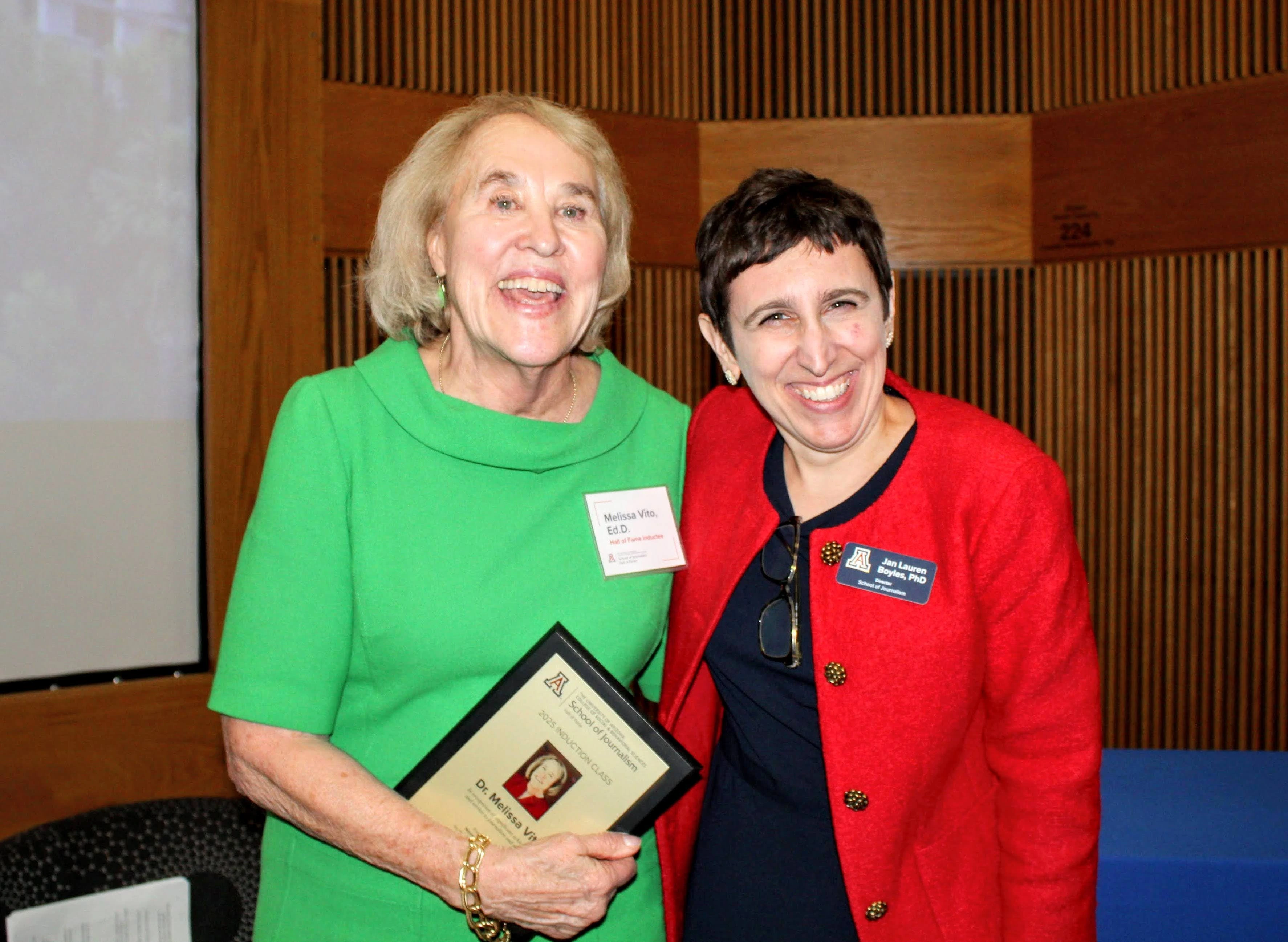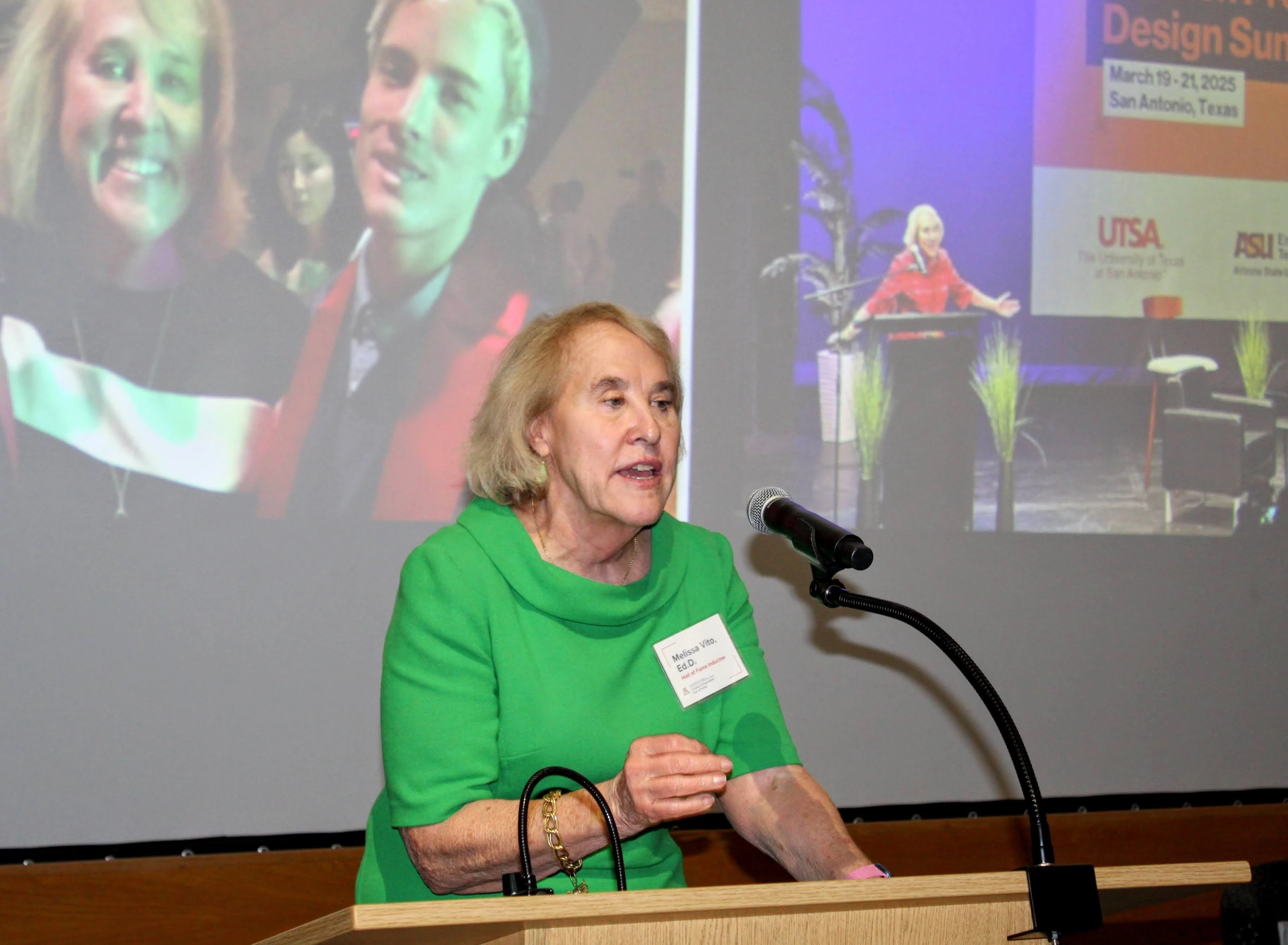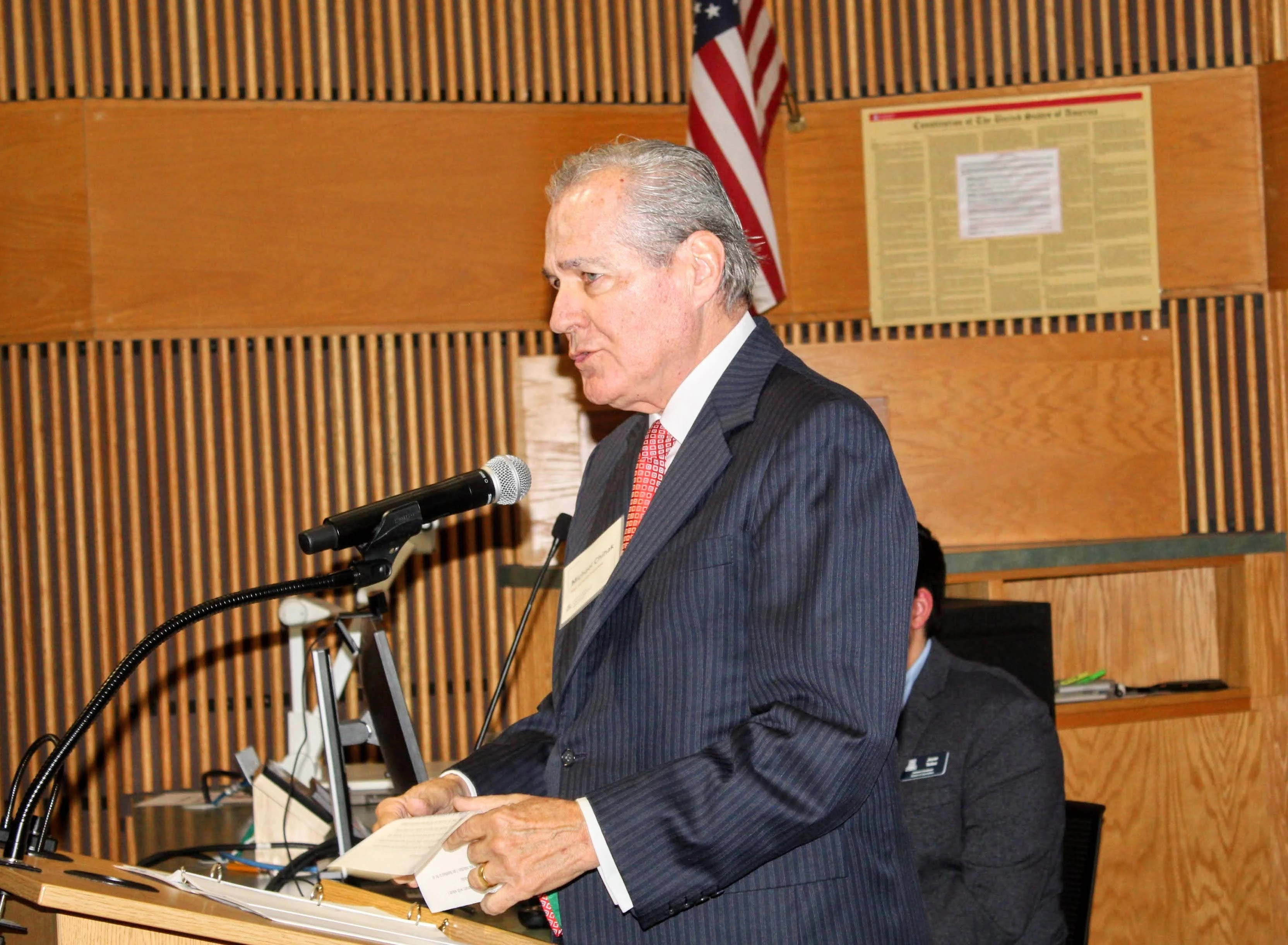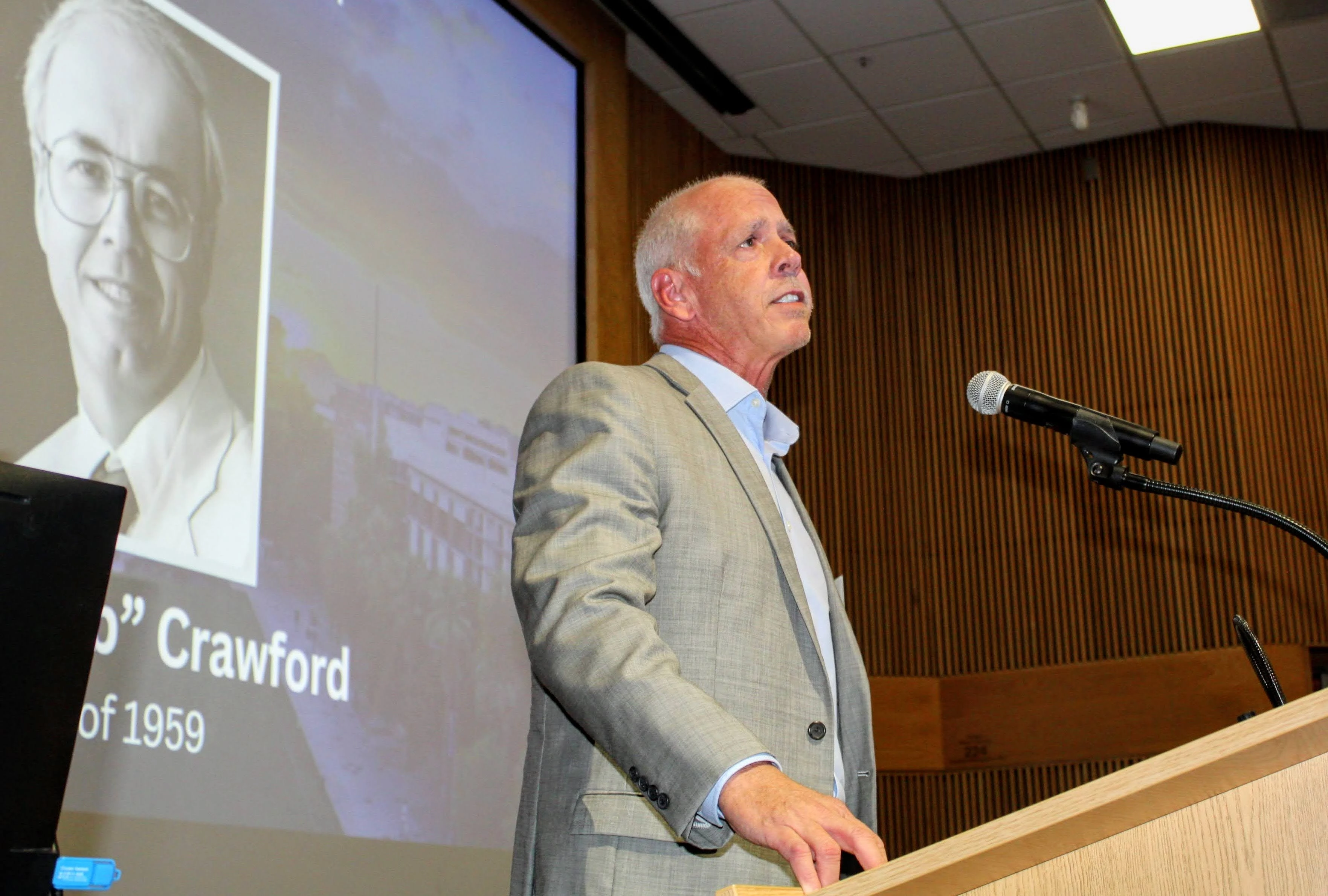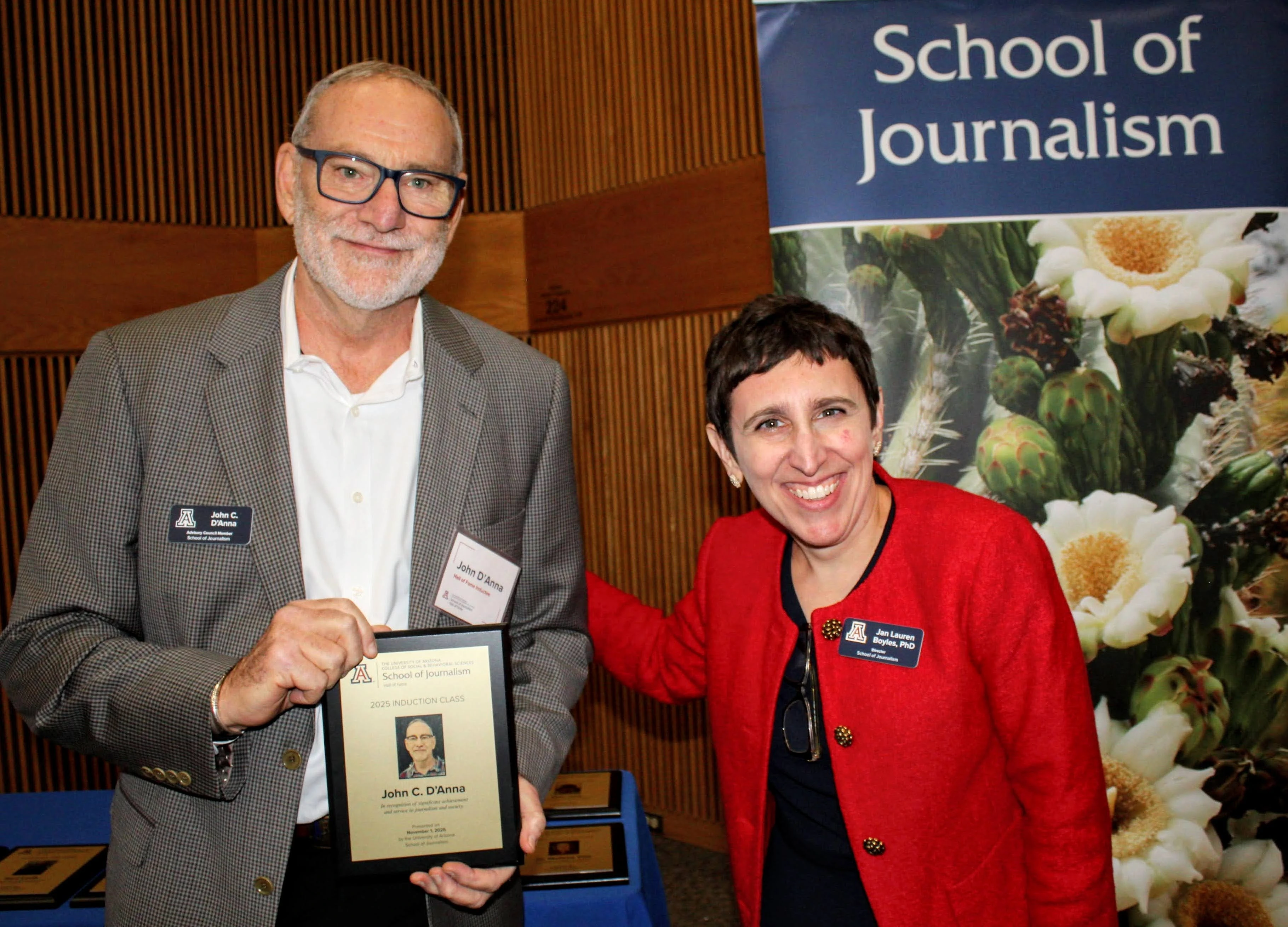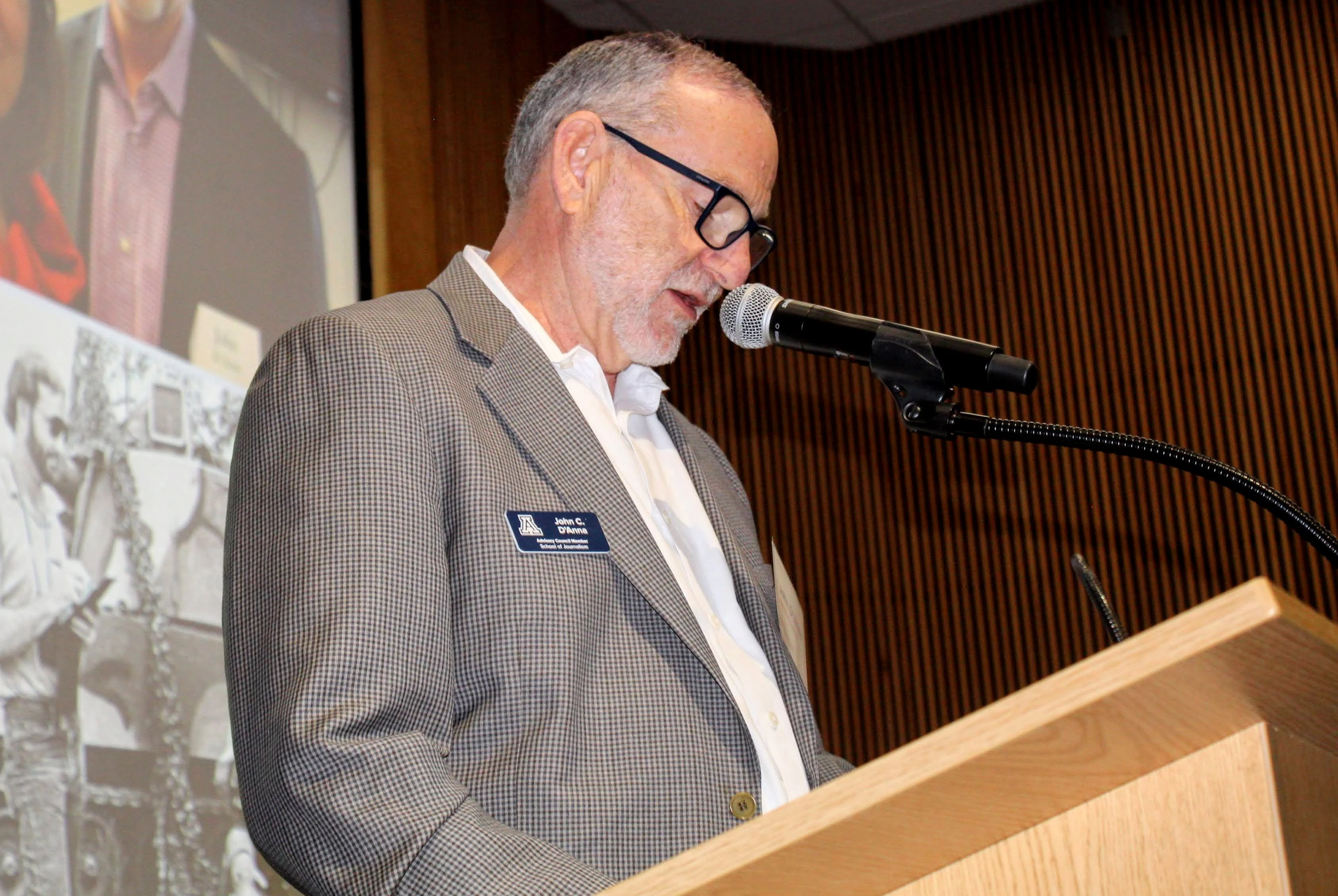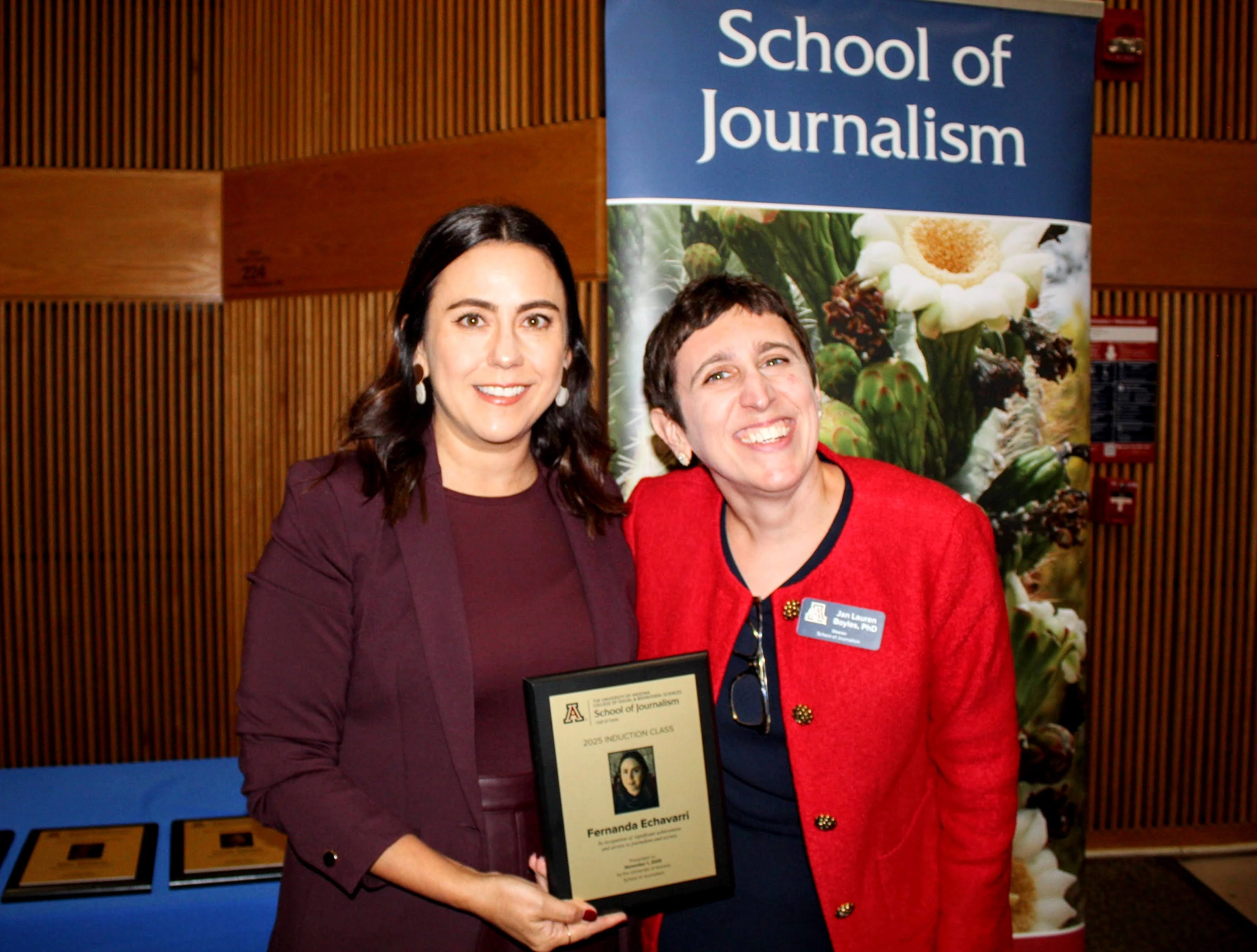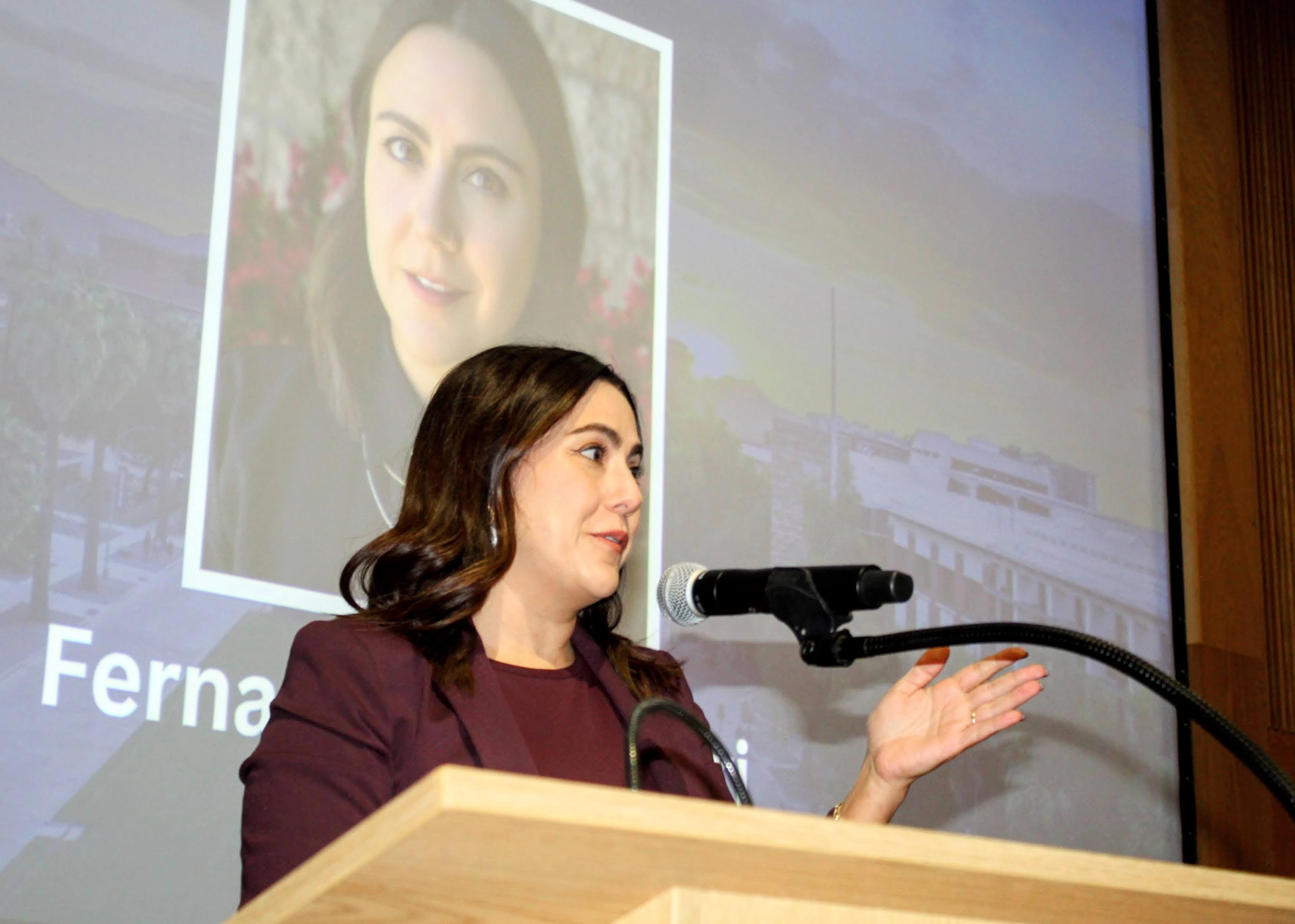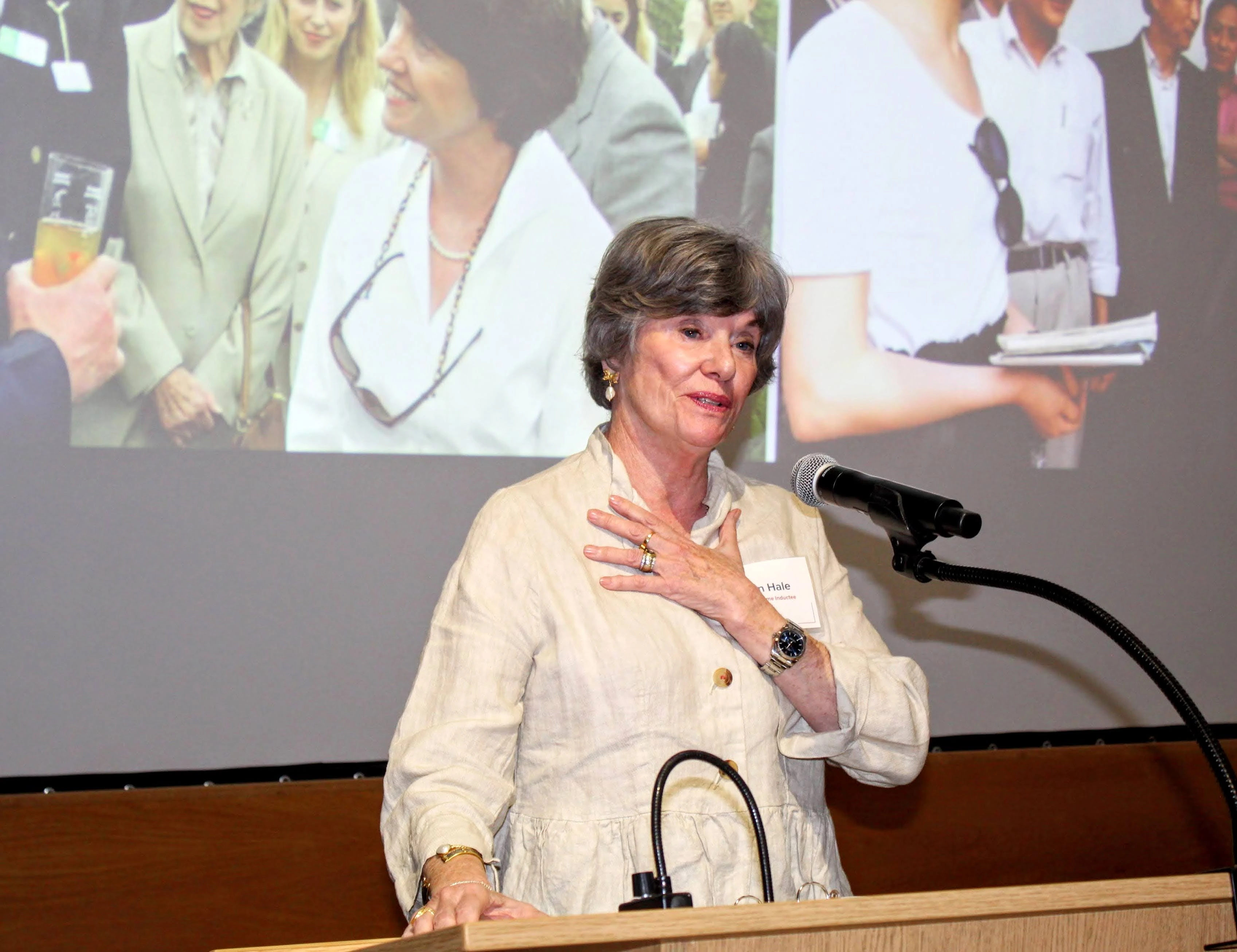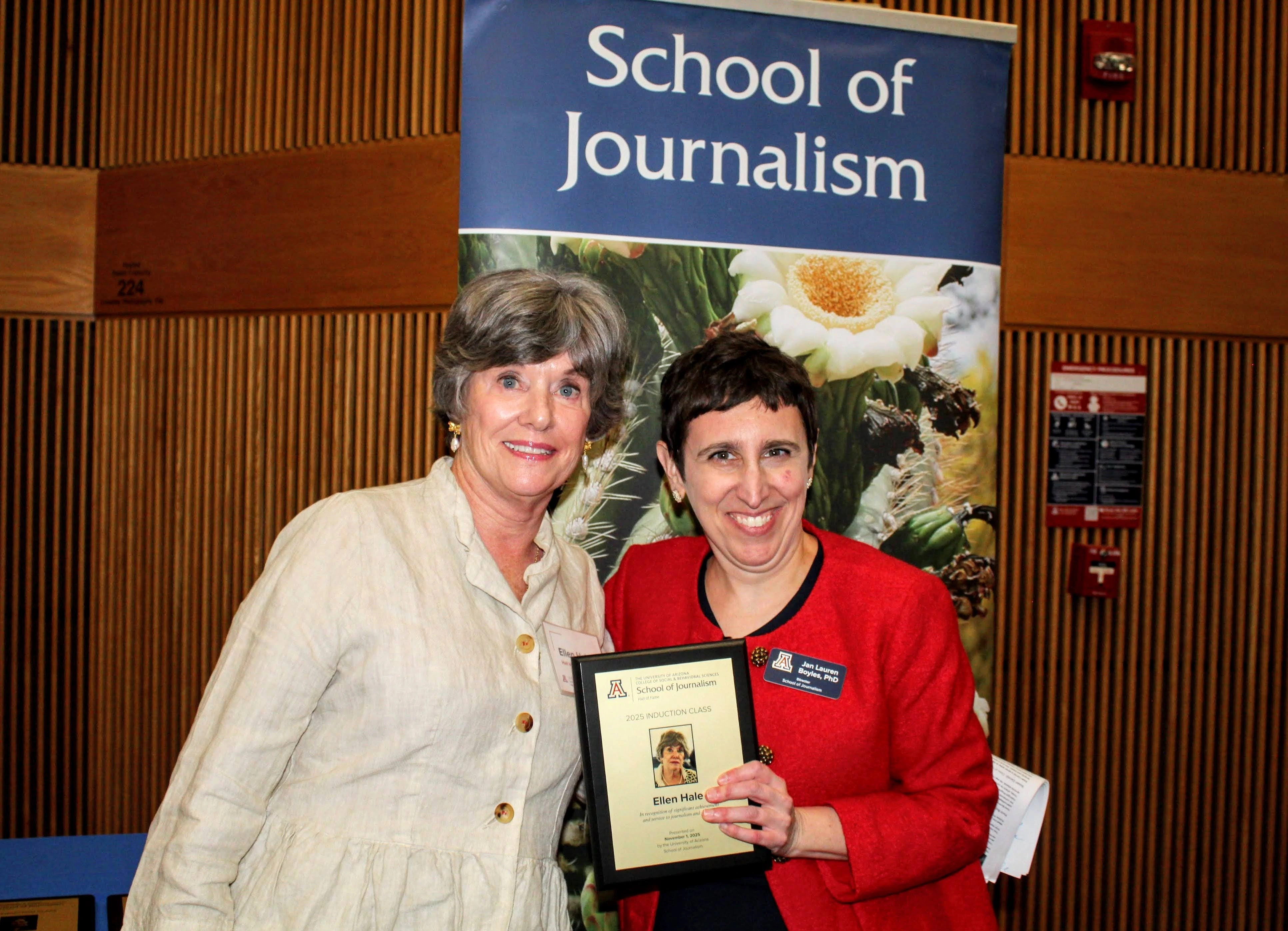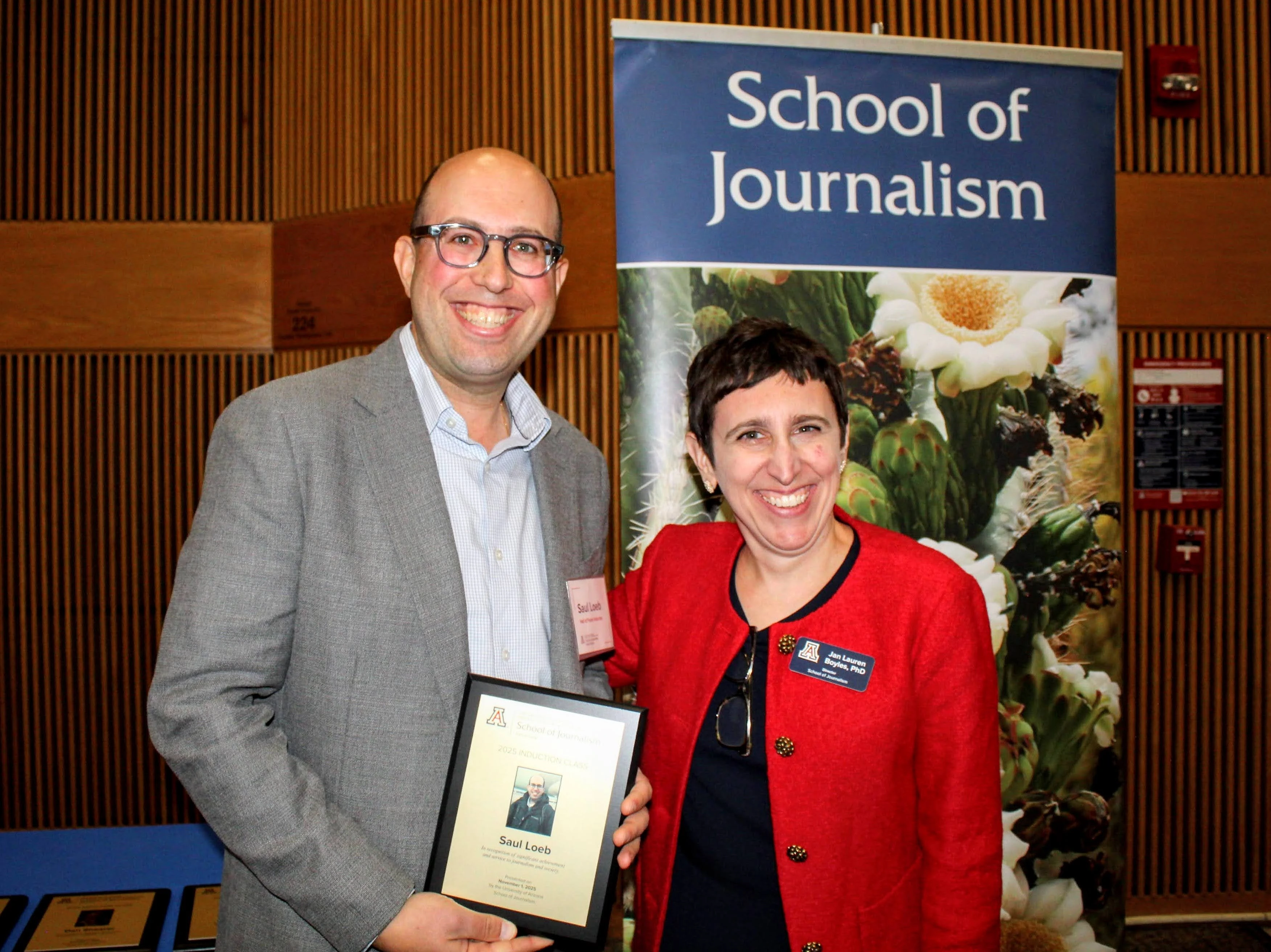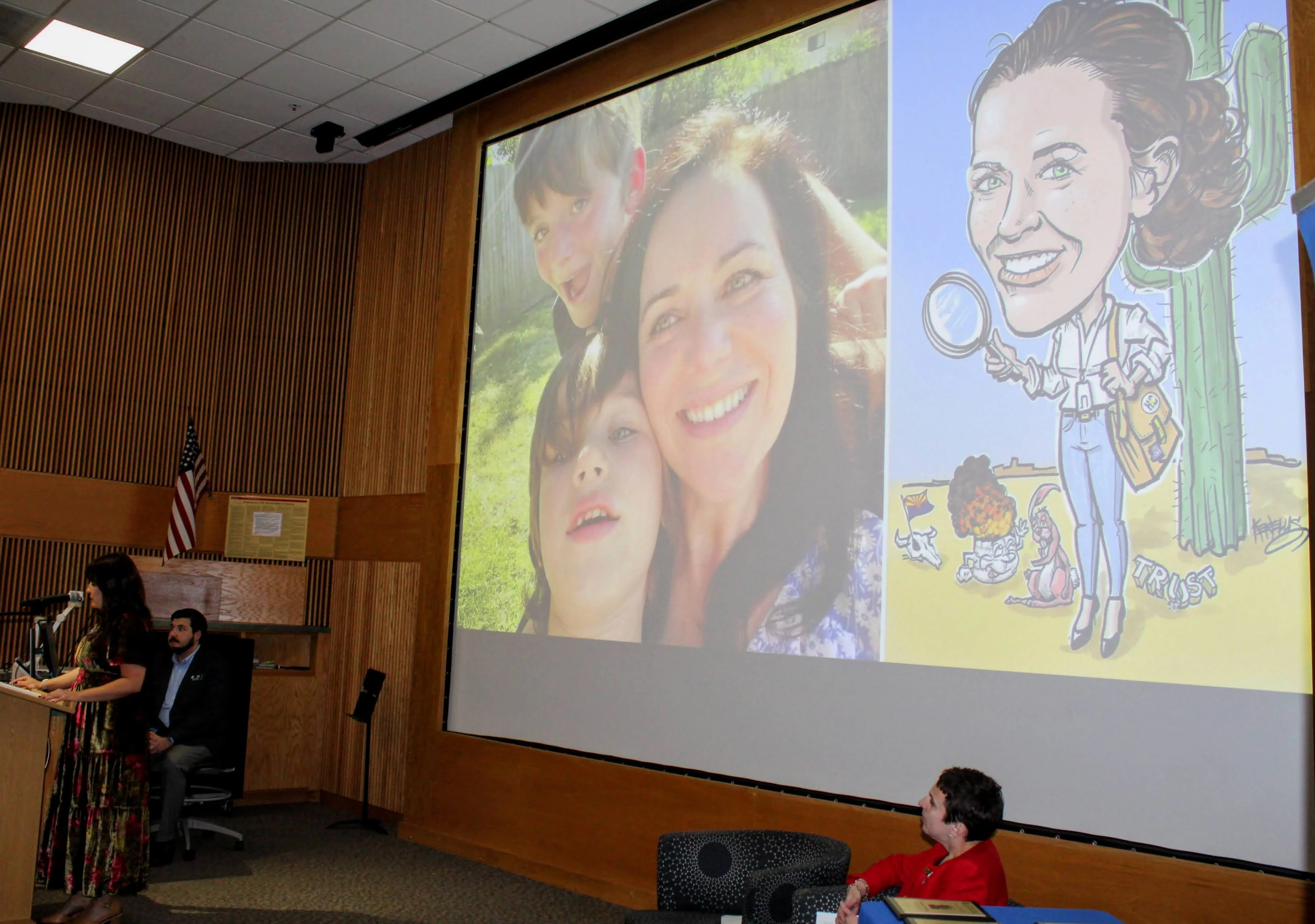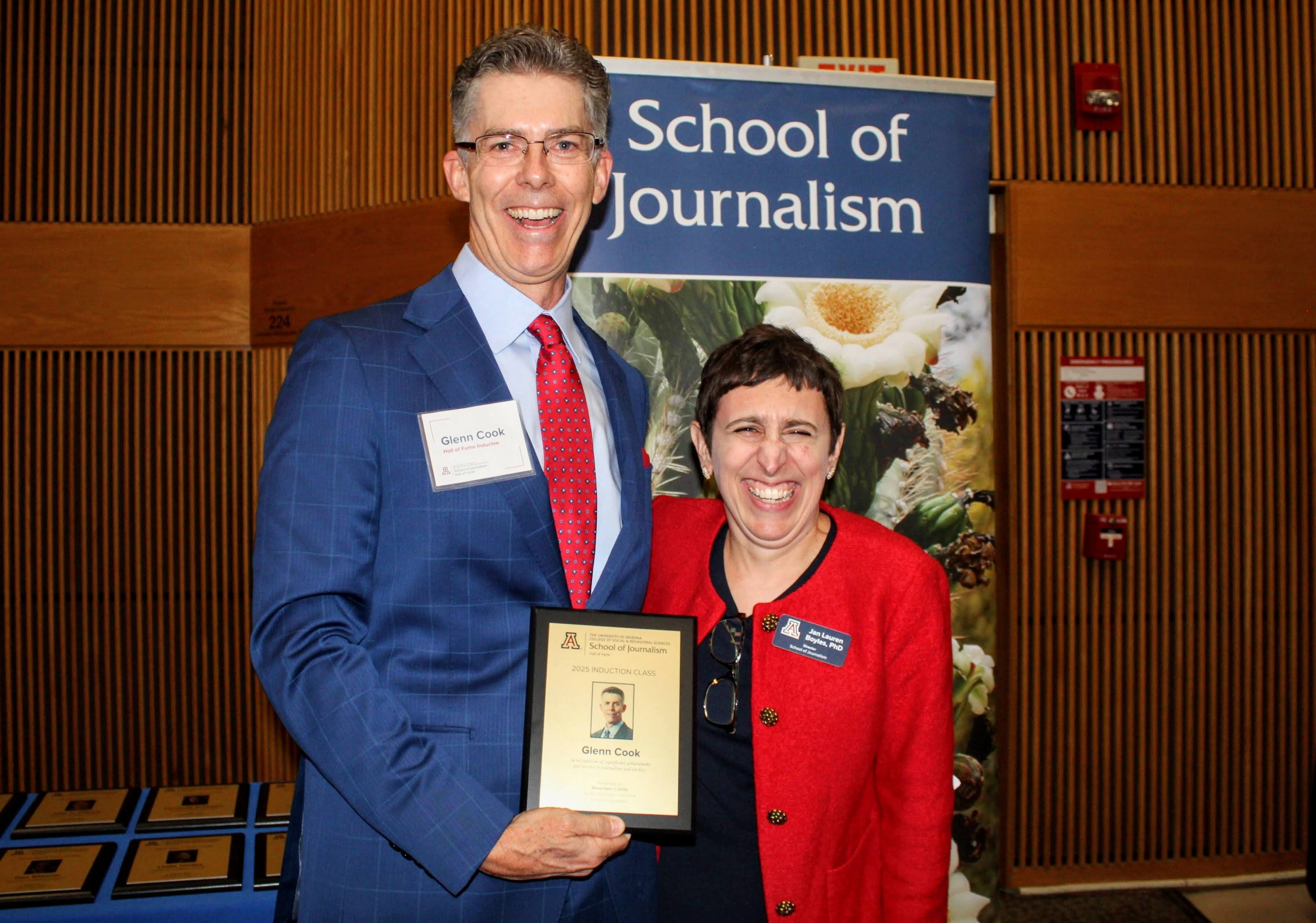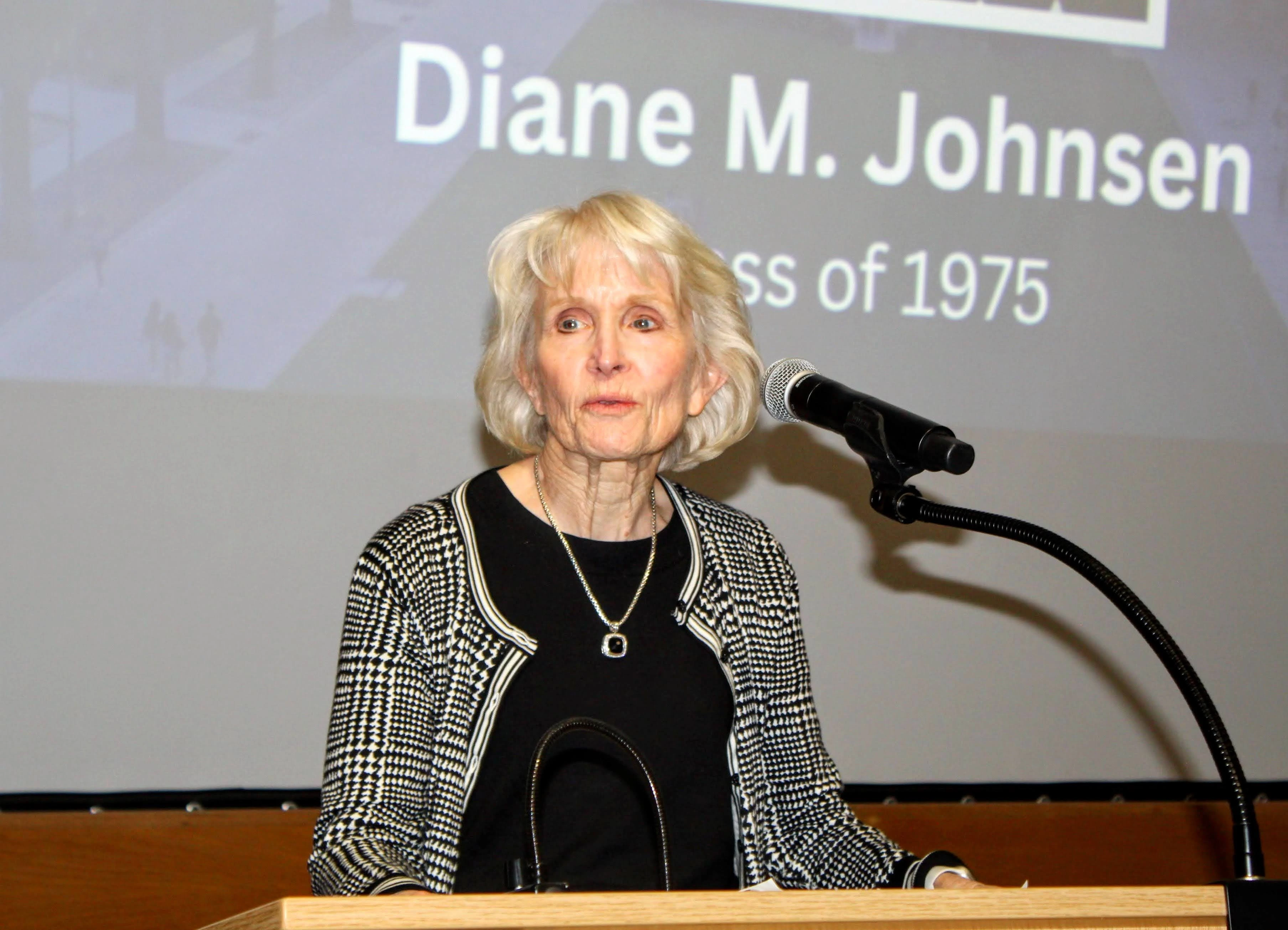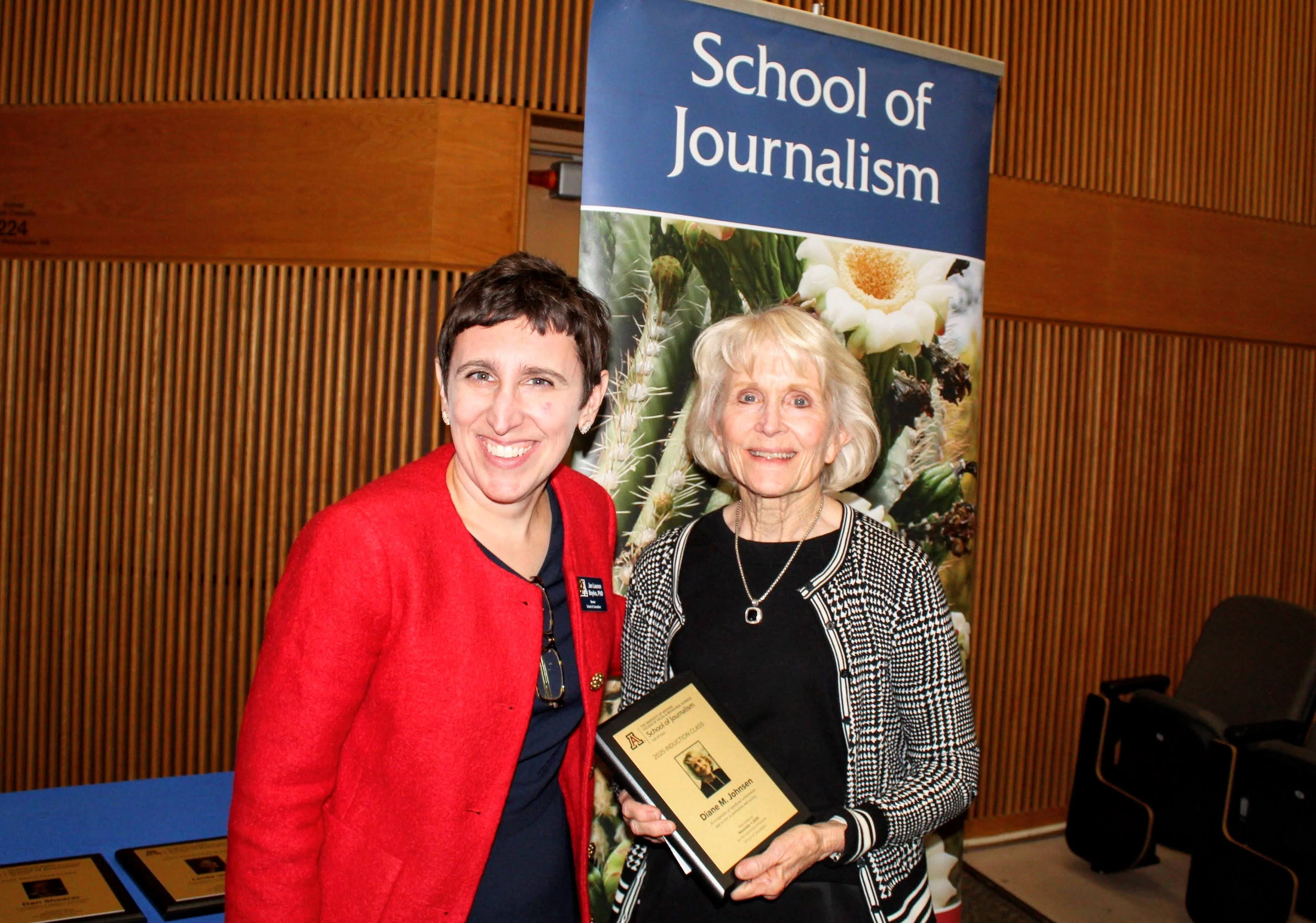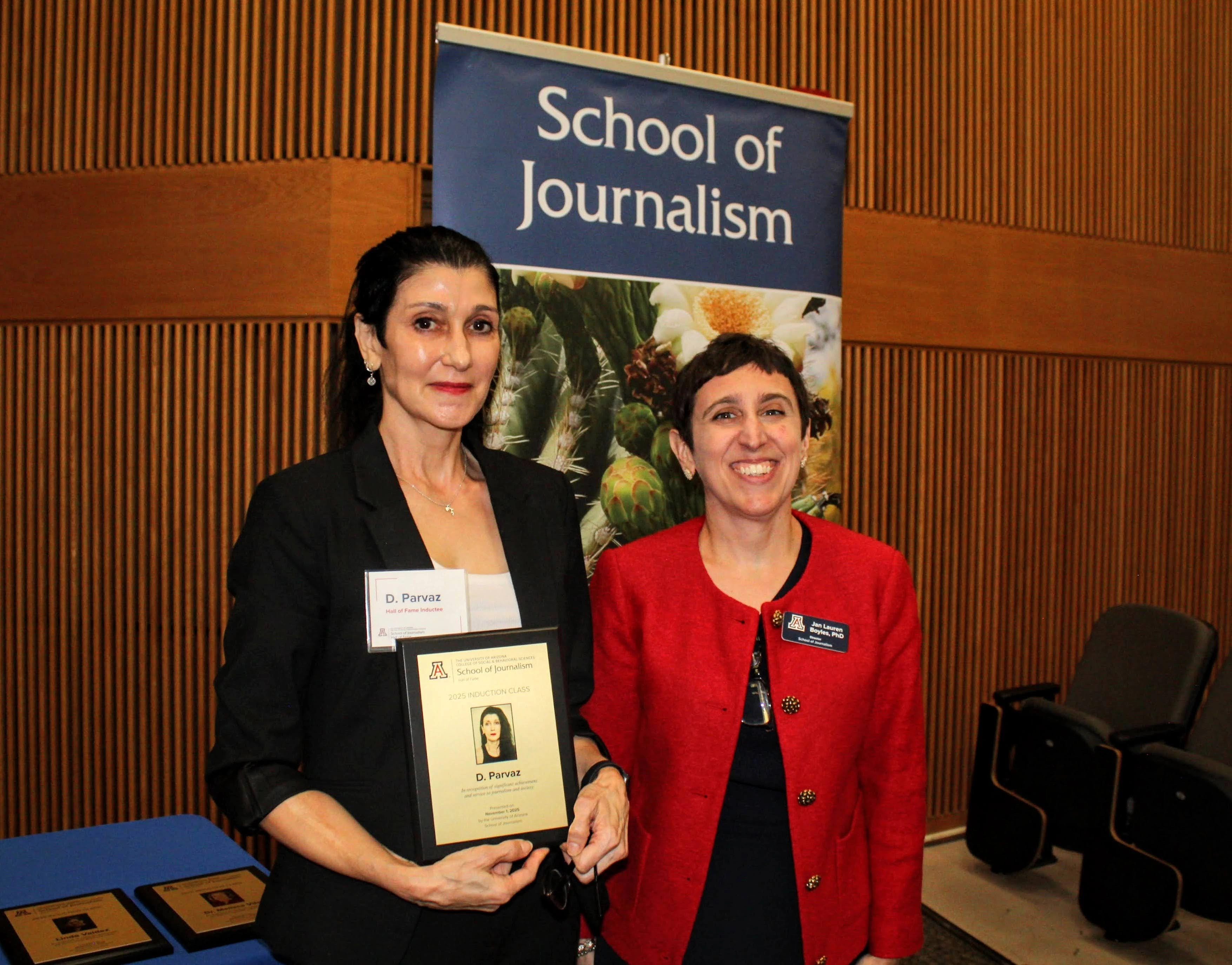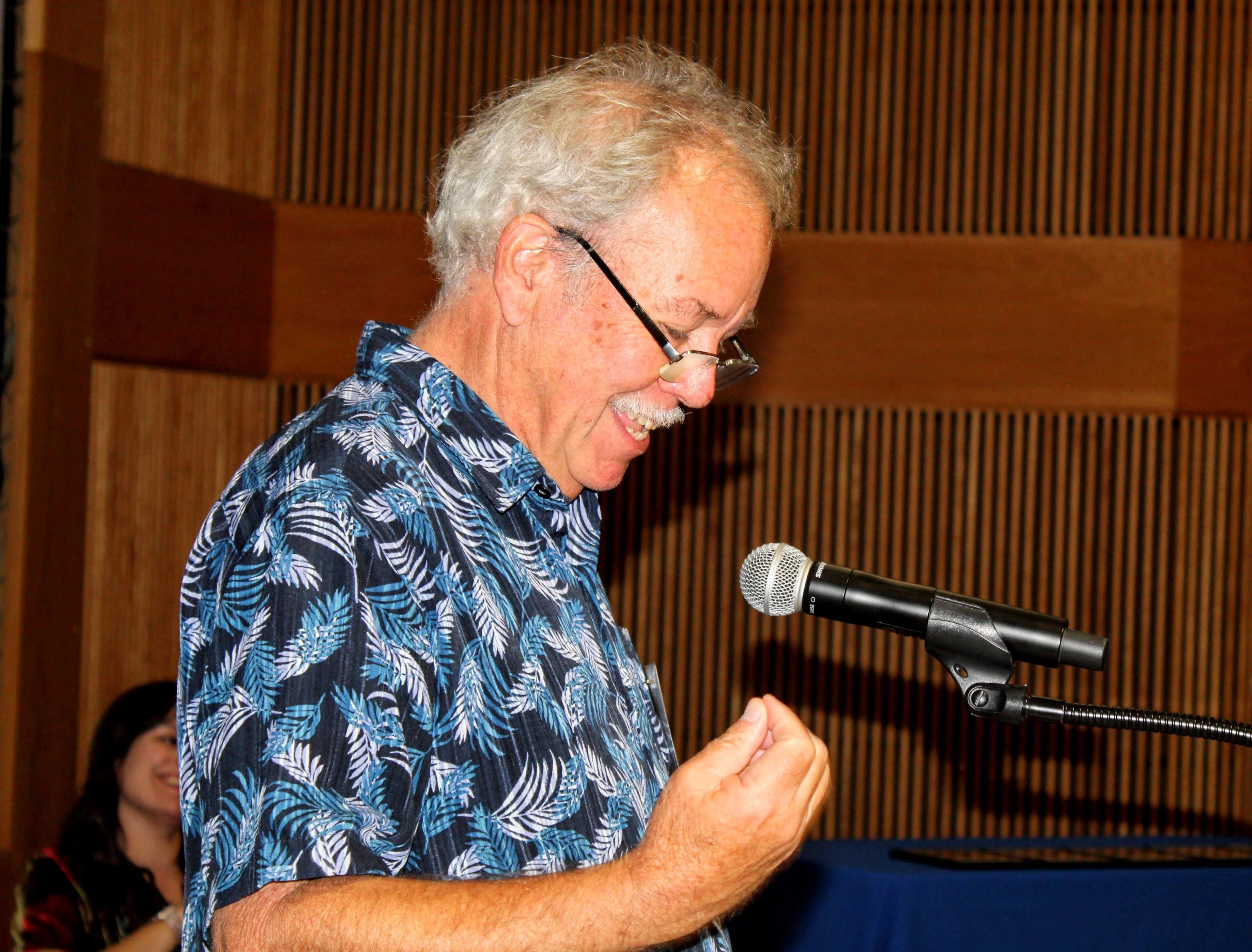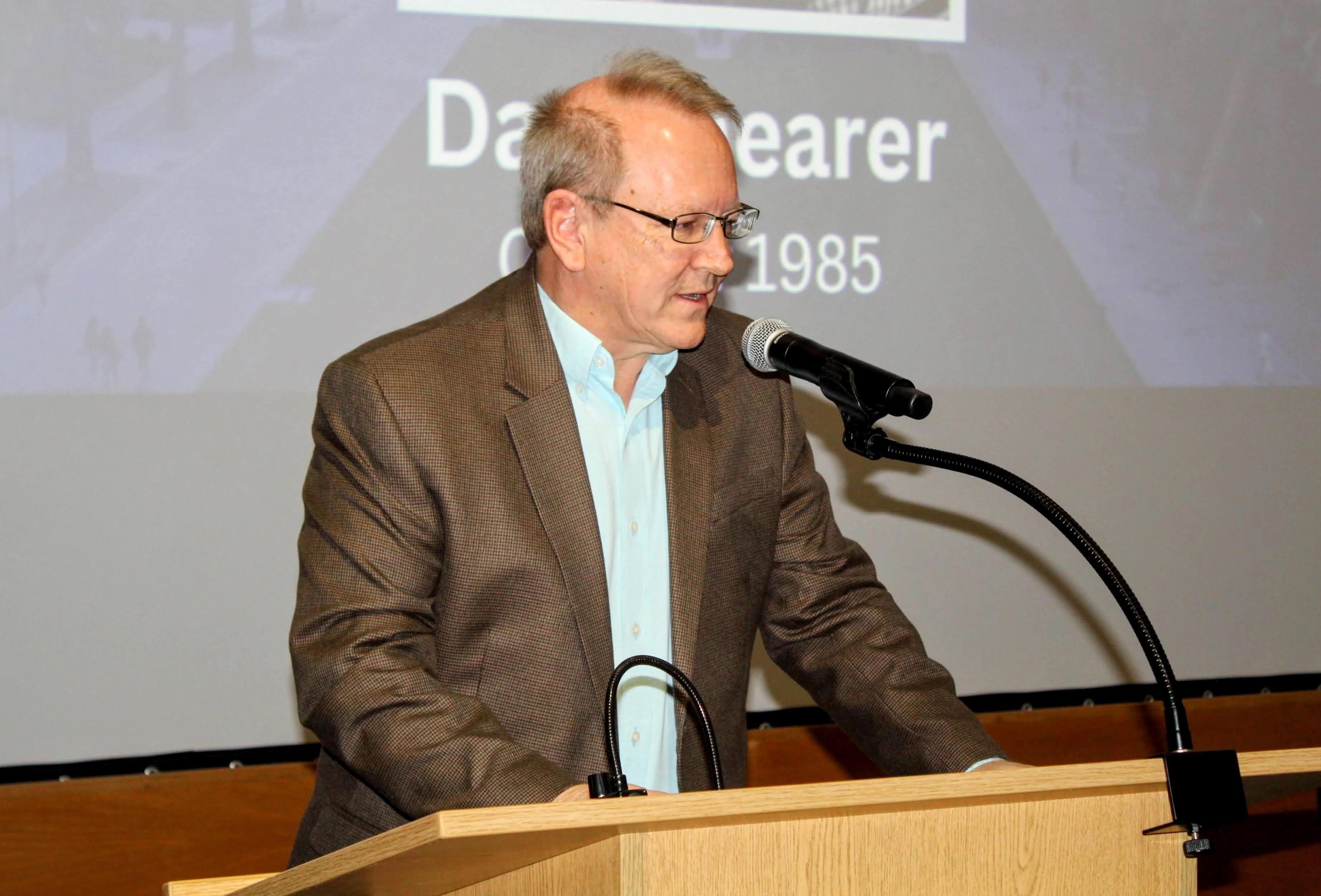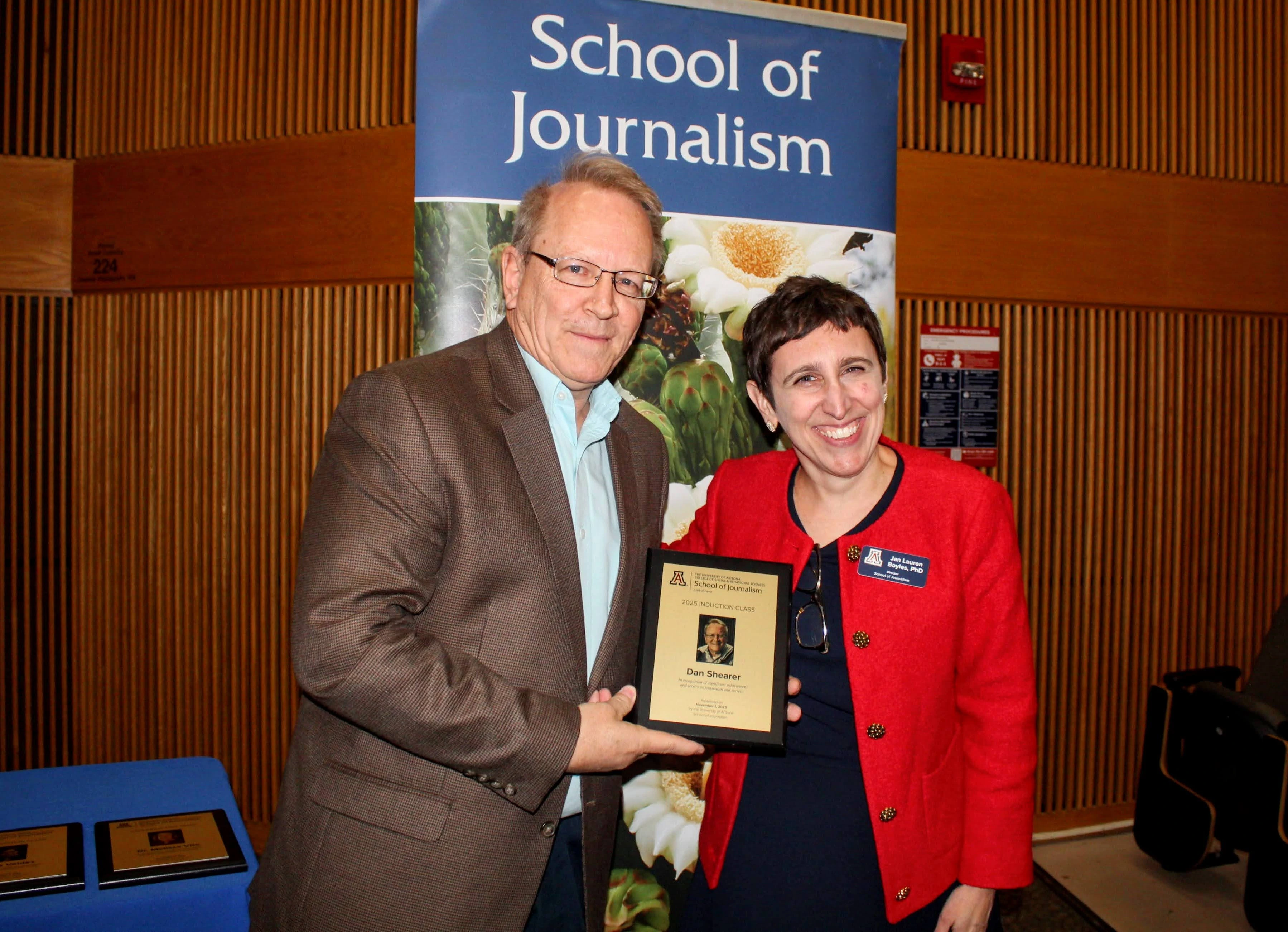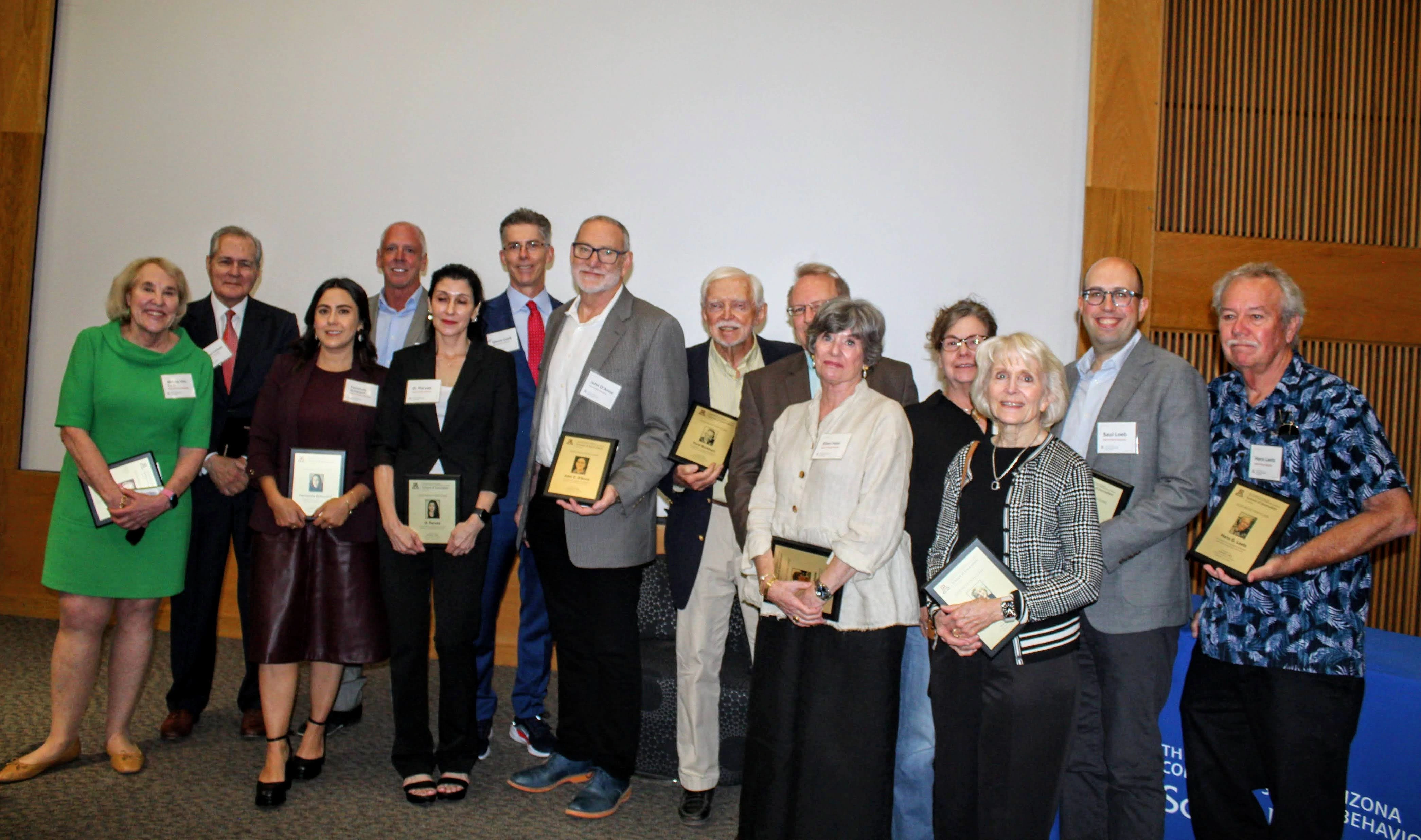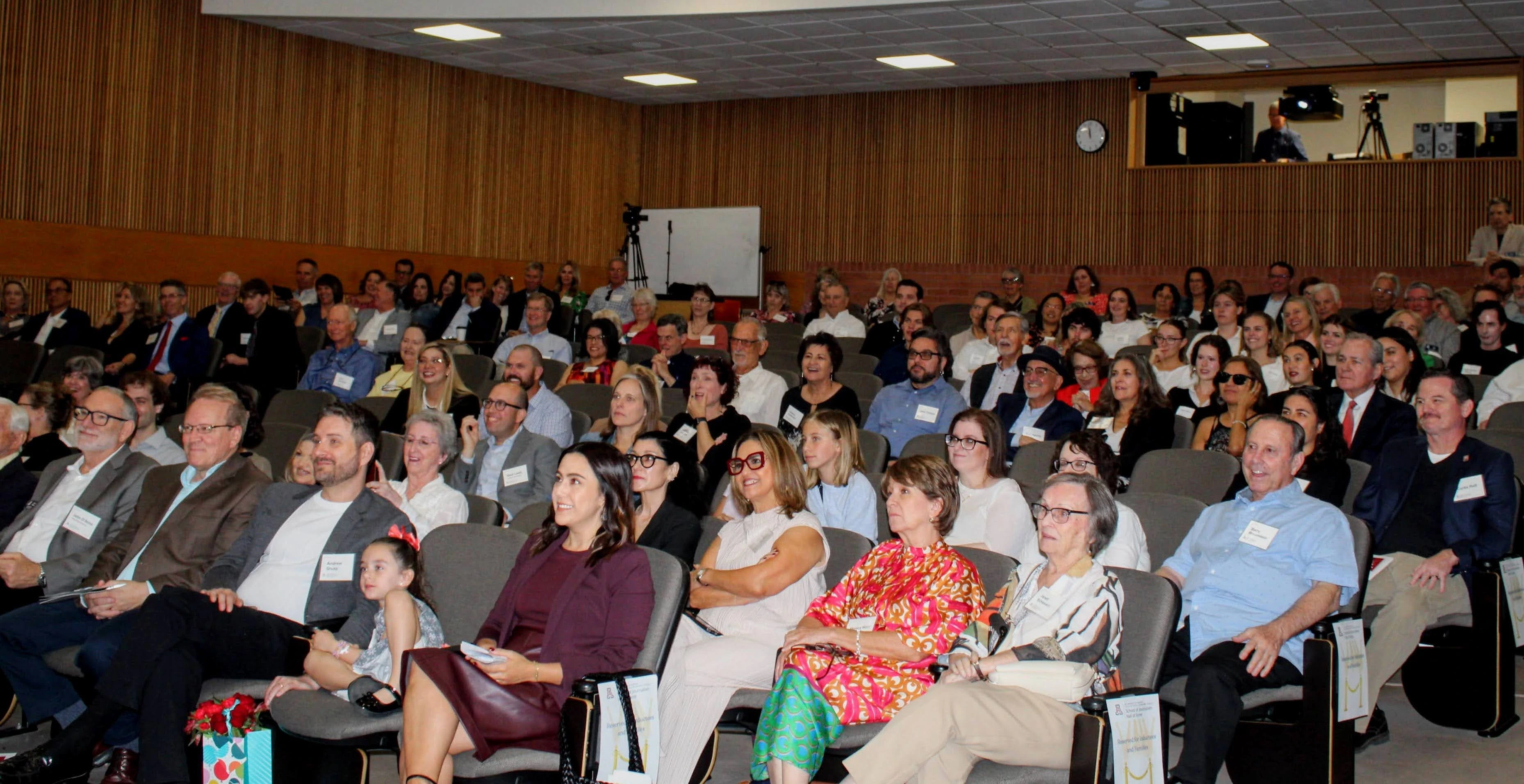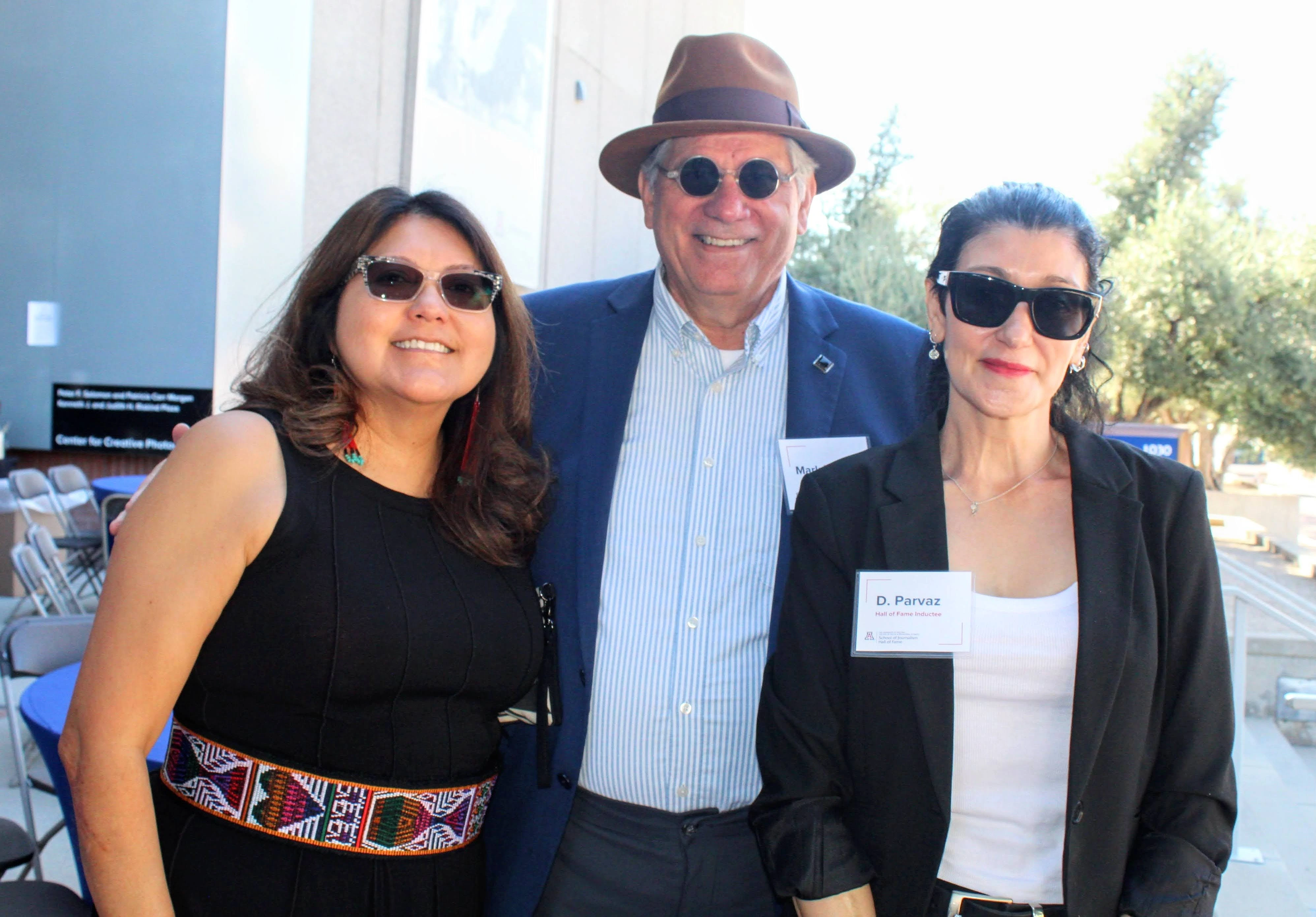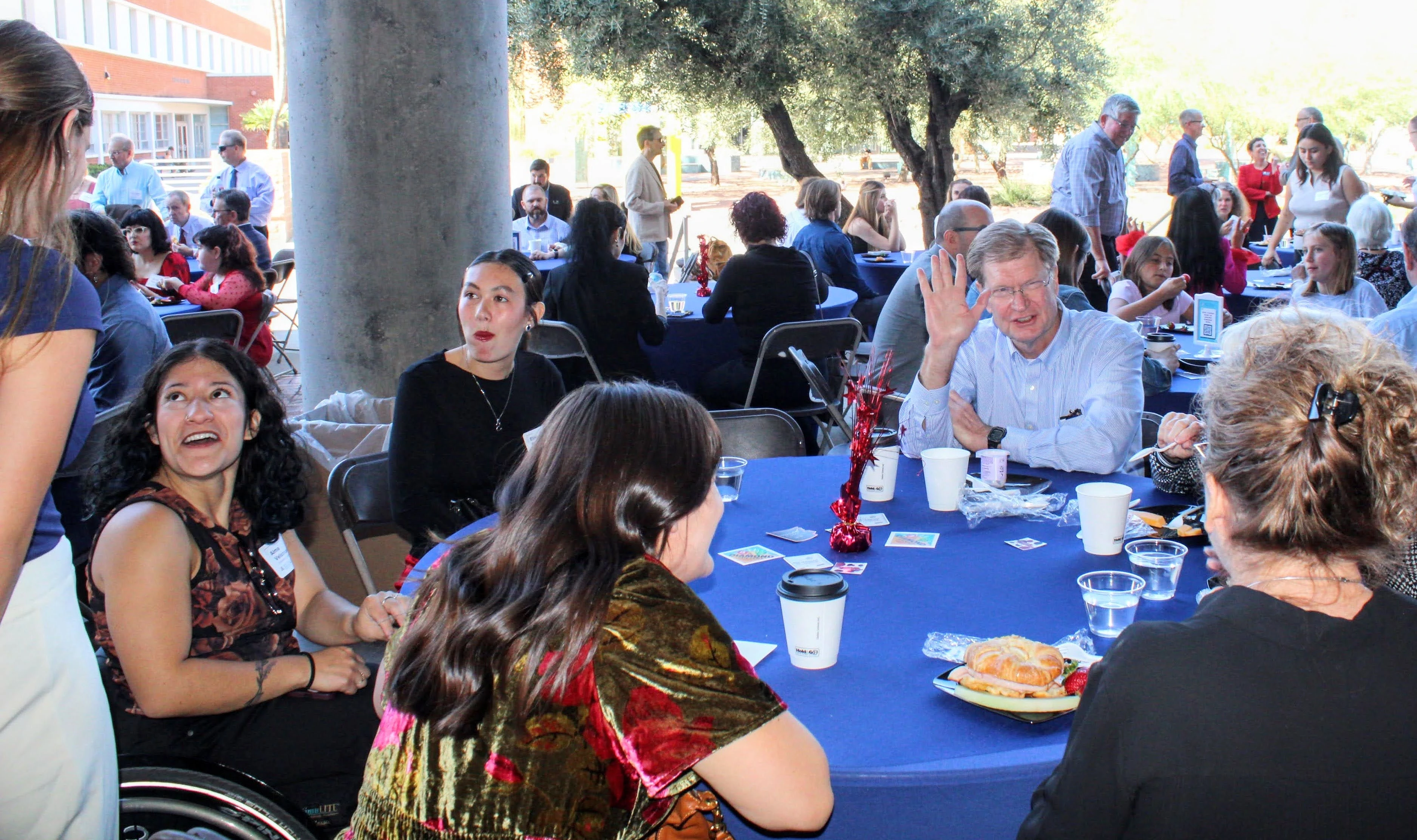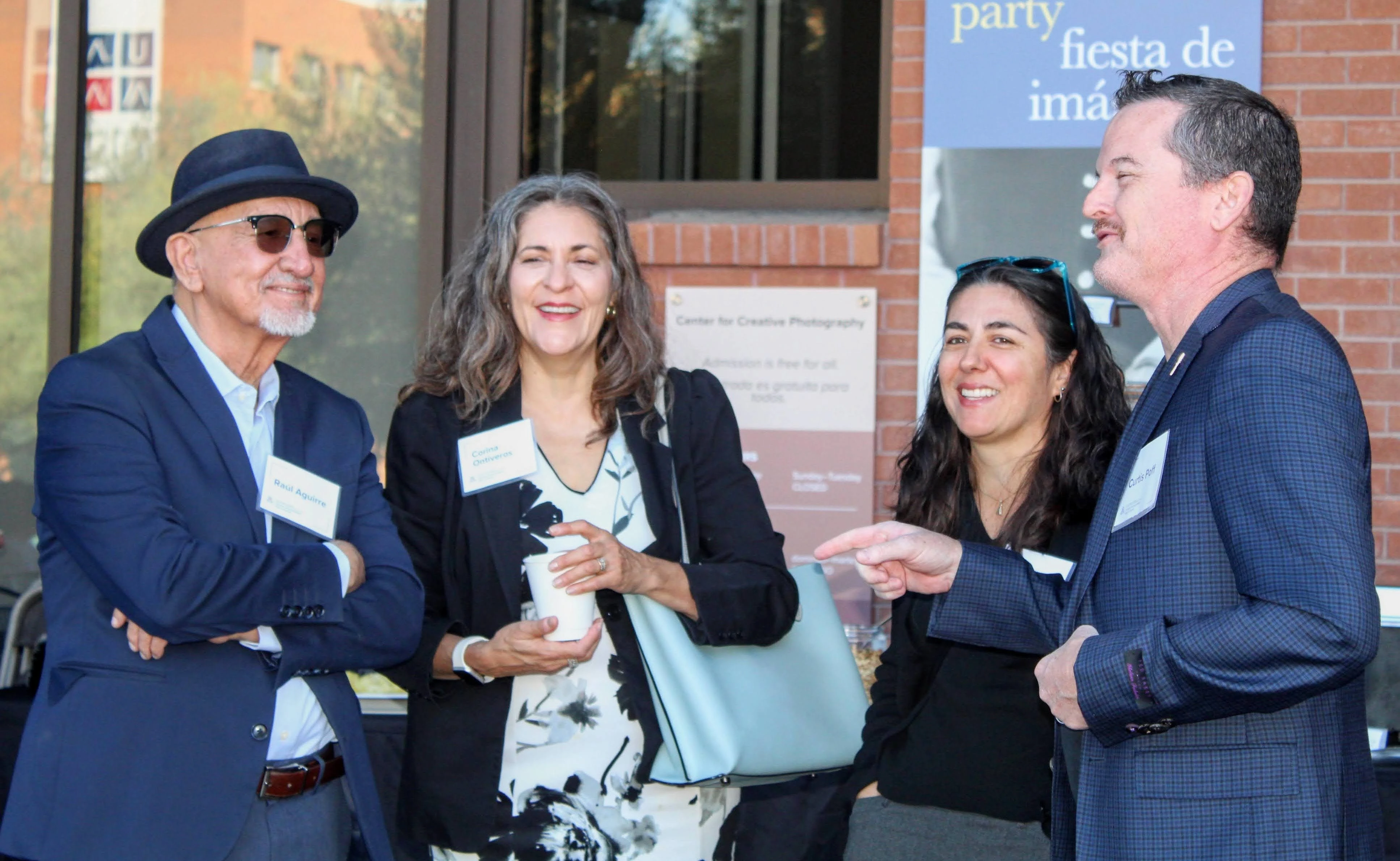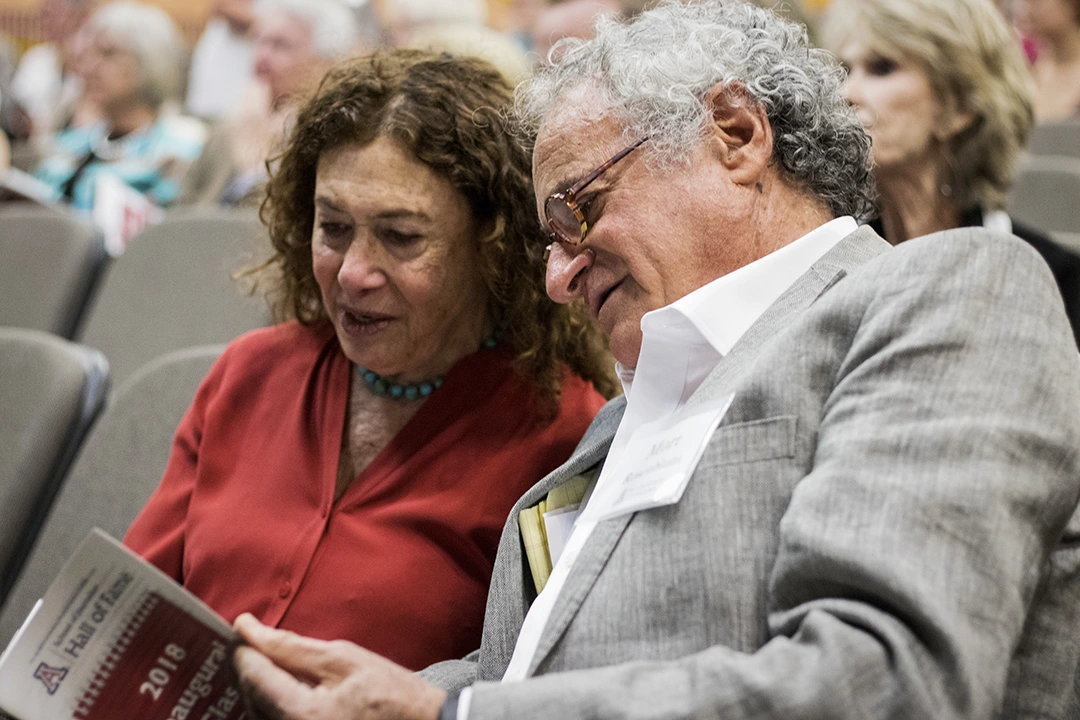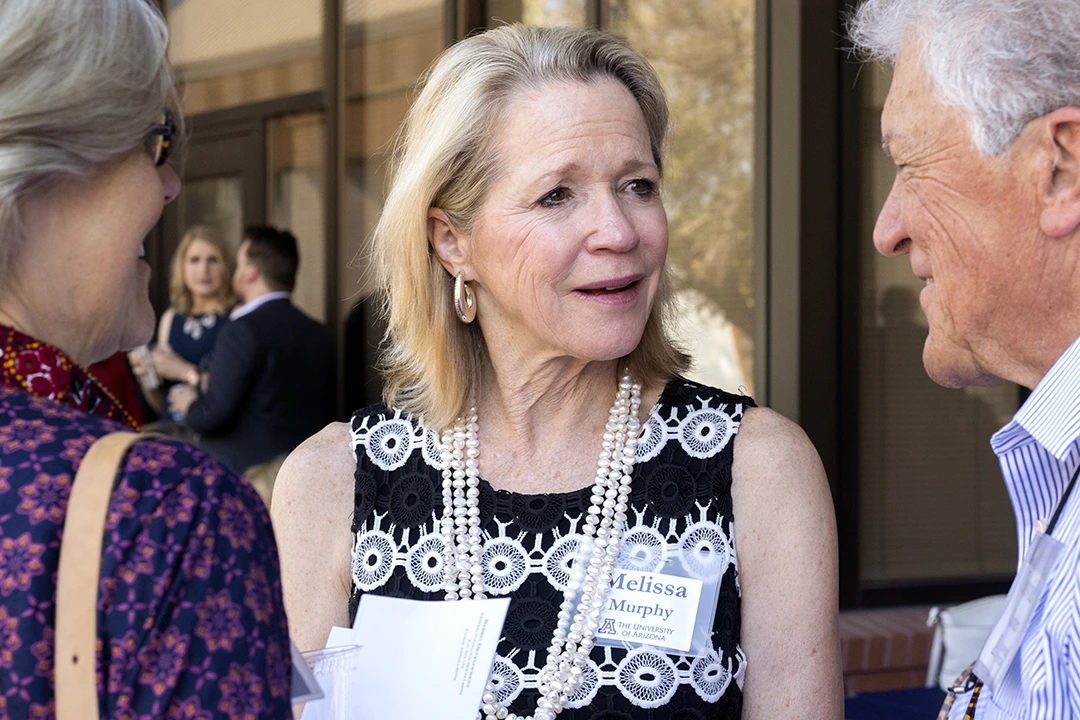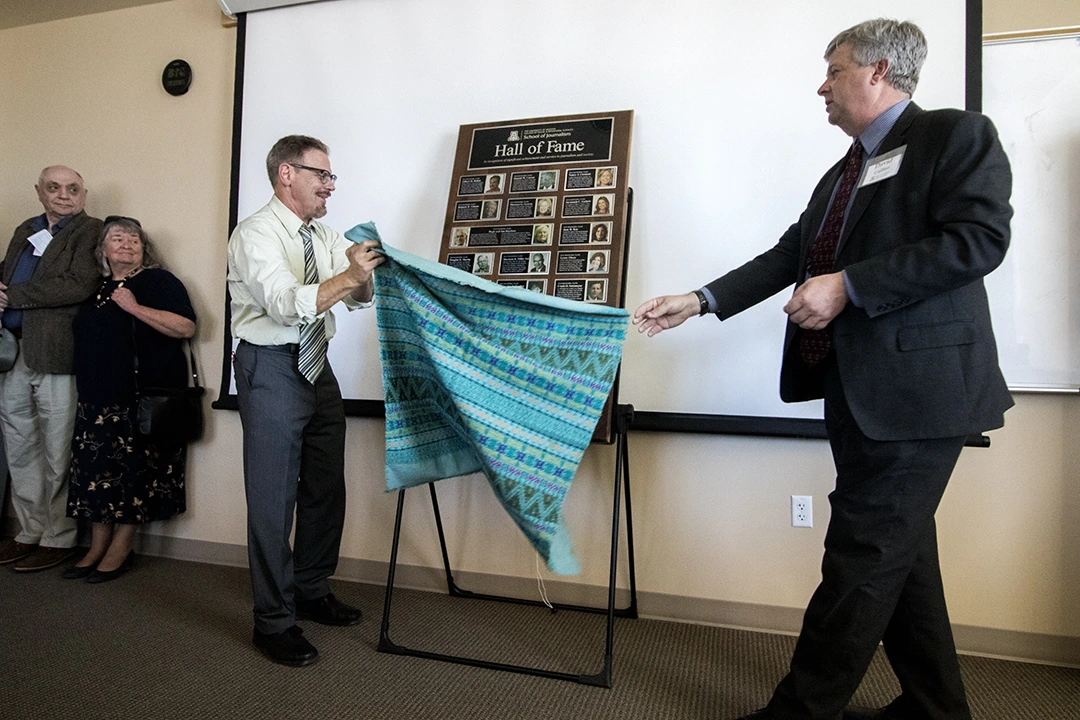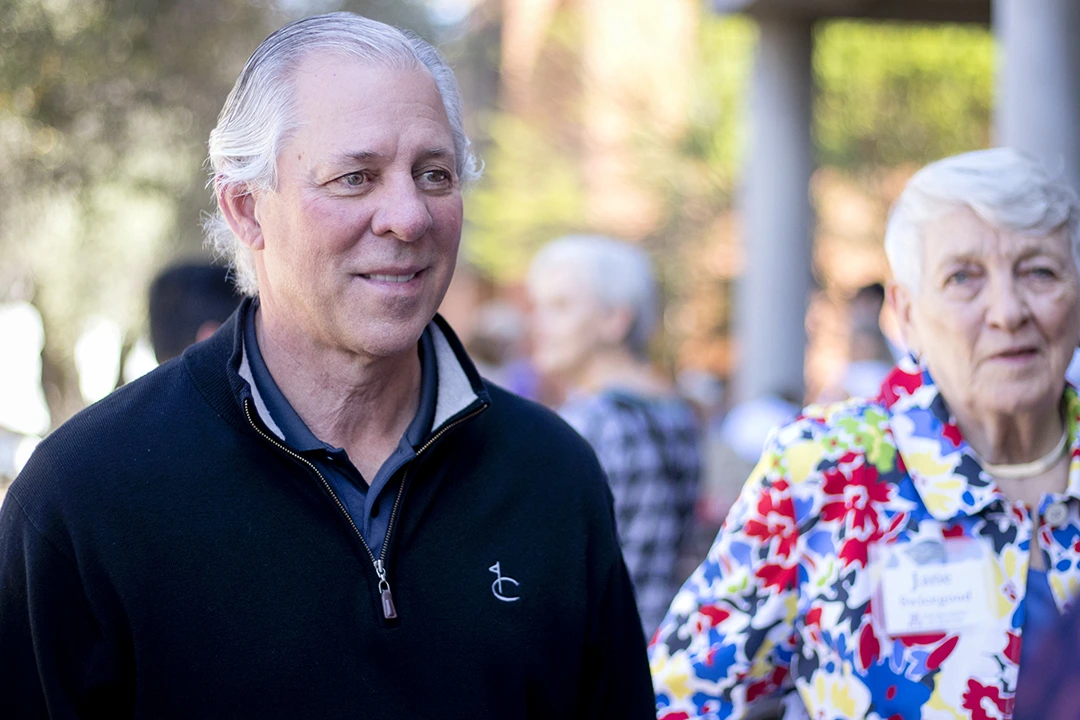For their exceptional contributions, significant achievements and unwavering service to journalism and society, the School of Journalism proudly recognizes a distinguished group of professionals by inducting them into our Hall of Fame. This prestigious recognition celebrates those whose work has not only advanced the field of journalism but also made a lasting impact on the broader community. Through their dedication, integrity and innovation, these individuals have set the highest standards of excellence, and their induction into the Hall of Fame honors their enduring legacy as pioneers and leaders in the field.
Third Cohort Inducted in 2025

Fifteen School of Journalism alumni were inducted into the Hall of Fame for their outstanding contributions to the field of journalism and service to society on November 1, 2025.
Meet the most recent Hall of Fame honorees:
- Ford Burkhart (’63) – Professor emeritus at the School of Journalism and former New York Times editor and writer.
- Susan Carroll (’99) – NBC News senior editor and investigative journalist (posthumous).
- Michael A. Chihak (’71) – Longtime newspaper reporter, editor and publisher; former Arizona Public Media news director.
- Glenn Cook (’92) – Executive editor and senior vice president for news at the Las Vegas Review-Journal.
- Robert “Bob” Crawford (’59) – Former Phoenix Gazette sportswriter, editor and Arizona Diamondbacks media relations manager (posthumous).
- John C. D’Anna (’83) – Managing editor at CalMatters; former senior reporter, columnist and editor at the Arizona Republic.
- Fernanda Echavarri (’07) – Managing editor of Futuro Media's "Latino USA" podcast and award-winning bilingual reporter.
- Ellen Hale (’73) – Former Associated Press senior vice president and former correspondent for USA Today.
- Diane M. Johnsen (’75) – Senior counsel at Perkins Coie law firm and former chief judge of the Arizona Court of Appeals, Division One.
- Hans G. Laetz (’82) – Founder and general manager of the KBUU radio station in Malibu, California.
- Saul Loeb (’04) – Agence France-Presse photojournalist who has covered four U.S. presidents.
- D. Parvaz (’97, M.A.) – NPR editor and award-winning former international Al Jazeera reporter and producer.
- Dan Shearer (’85) – Editorial director for Wick Communications and editor of Southern Arizona’s Green Valley News and Sahuarita Sun newspapers.
- Linda Valdez (’80) – Author and longtime columnist for the Arizona Republic and the Arizona Daily Star.
- Dr. Melissa Vito (’74) – Nationally recognized higher education leader and former senior vice president and senior vice provost at the University of Arizona.
View photos from the 2025 ceremony, taken by School of Journalism student Josie Shivers, below:
Second Cohort Inducted in 2022
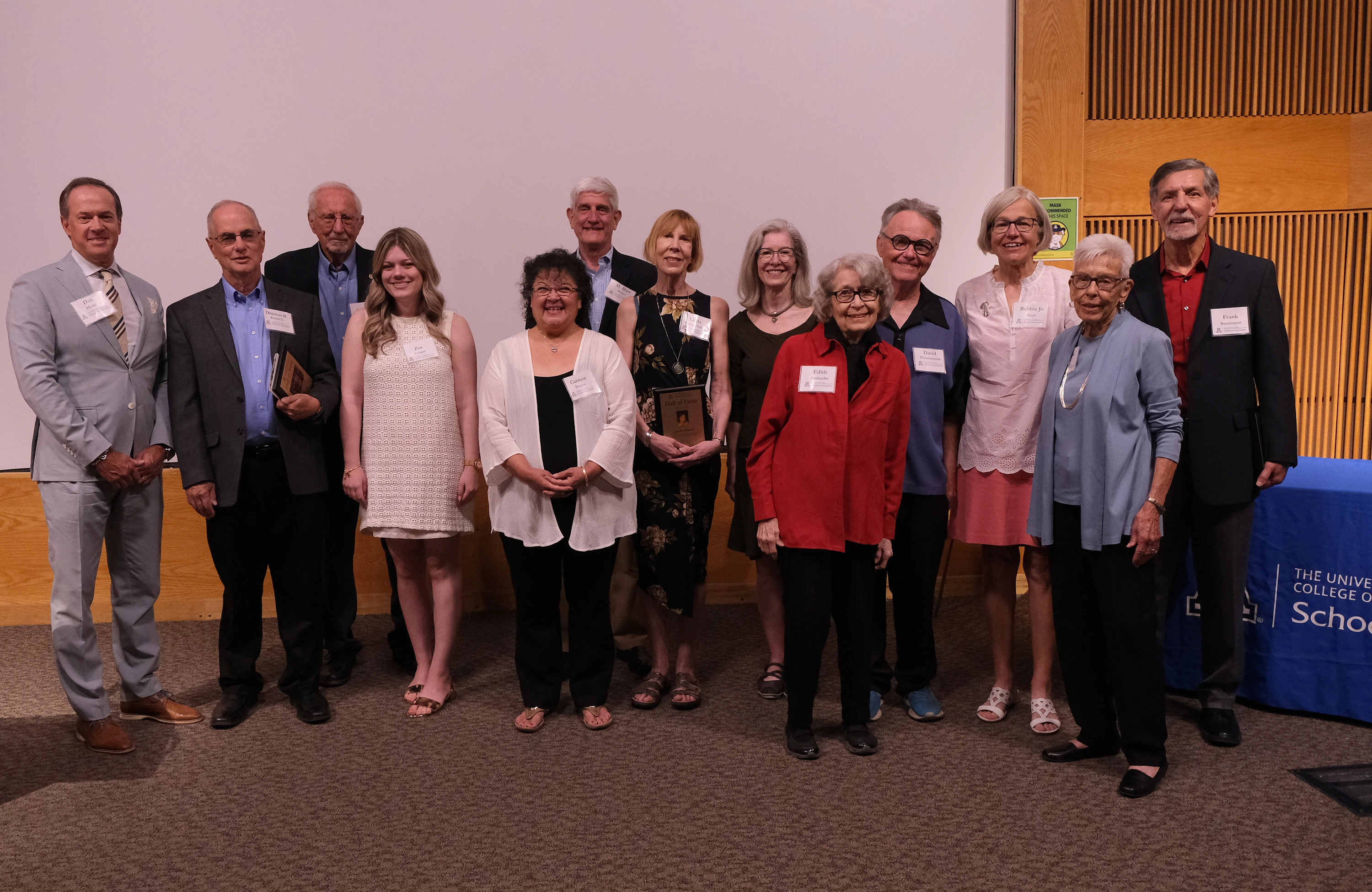
Inductees or family/friends: From left, Dan Hicks, Donovan M. Kramer Jr., James W. Johnson, Zoe Cooper, Carmen Duarte, H. Darr Beiser, Linda Luther-Veno (Lynn DeBruin), Patty Weiss Gelenberg, Edith Auslander, David Fitzsimmons, Bobbie Jo Buel, Earlene Ridge (George W. Ridge Jr.) and Frank Sotomayor (Nicholas Proffitt). Not pictured: Ernest Sotomayor, Michele Stephenson.
Photo by Gawain Douglas
For their significant achievements and service to journalism and society, 13 individuals and one family were inducted into the second class of the University of Arizona School of Journalism Hall of Fame.
The 2022 class was honored April 9 at the Center for Creative Photography auditorium, following a brunch outside the entrance.
A look at the 2022 class:
Edith Auslander (’61): UA Journalism professor and Arizona Daily Star journalist; National Association of Hispanic Journalists founder; Arizona Board of Regents president (first Hispanic woman on board); coordinated UA's diversity initiatives and scholarships for low-income students.
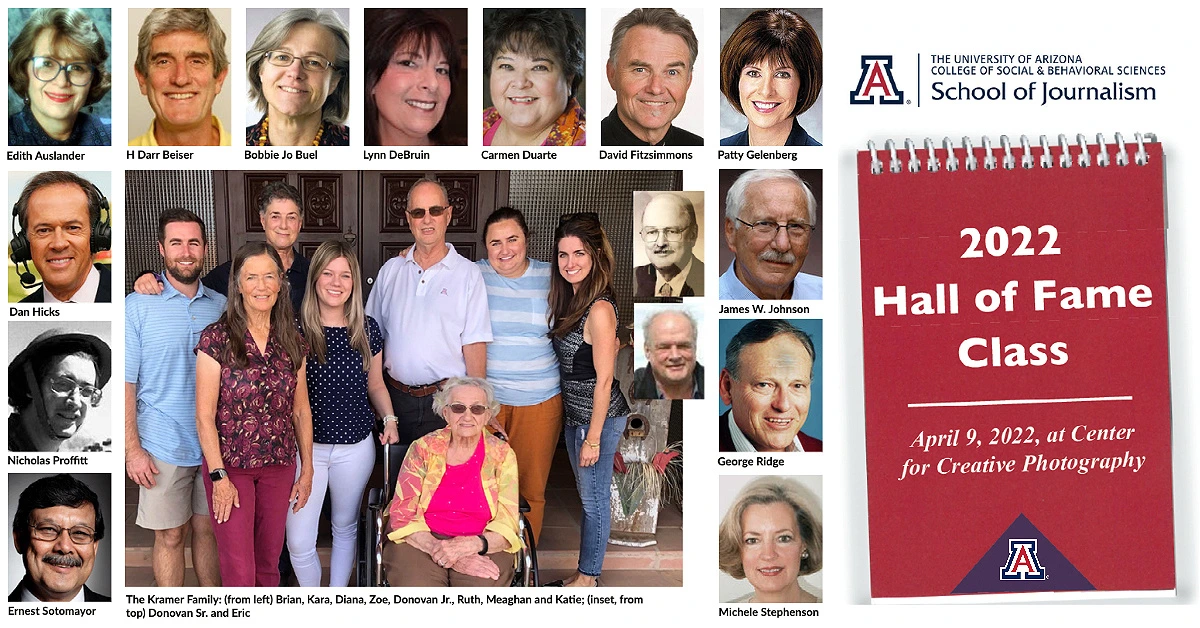
- H. Darr Beiser (’76): Longtime USA Today photographer who covered five presidents and got his start at Tucson Citizen.
- Bobbie Jo Buel (’79): Retired top editor of the Arizona Daily Star, where she worked for 36 years. Literacy Connects board member who just finished a five-year USS Arizona project of profiles of those killed at Pearl Harbor.
- Lynn DeBruin (’84): Pioneer female sports reporter in Mesa and Denver who covered NFL teams. Later covered NBA for AP bureau in Utah. She died in 2013.
- Carmen Duarte (’80): Arizona Daily Star reporter who has covered Tucson for 40 years; author of acclaimed book, “Mama’s Santos: An Arizona Life.”
- David Fitzsimmons (’77 Fine Arts): Longtime political cartoonist and column writer for the Arizona Daily Star. Pulitzer Prize finalist.
- Patty (Weiss) Gelenberg (’71) First female evening anchor for major-market Arizona television station at KVOA-TV.
- Dan Hicks (’84): Veteran NBC golf and Olympics broadcaster who started his career at Tucson's KVOA-TV and CNN. Has called a dozen Olympics, including swimming and skiing, and covered the NFL, NBA and tennis.
- James W. Johnson (’61): Prof. emeritus at UA J-school. His Reporting Public Affairs (RPA) course was legendary. Former journalist/editor in Oakland. Has written or co-written nearly a dozen books, including bio on Mo Udall and many sports biographies.
- Kramer family: Owners of Casa Grande Valley Newspapers Inc., with multiple community news outlets in state, led by Donovan M. Kramer Jr. (’76) and Kara K. Cooper (’79). Their mom, Ruth, started the operation with her late husband, Donovan M. Kramer Sr.
- Nicholas Proffitt (’68): Newsweek reporter known for his Vietnam and Fall of Saigon coverage. Later became a fiction writer and saw one of his books developed into a 1987 Francis Ford Coppola movie, “Gardens of Stone.” He died in 2006.
- George Ridge: Two-time director of the J-school and a professor emeritus; attorney whose press law and ethics course became legendary; negotiated Tombstone Epitaph deal. He died in 2019.
- Ernest Sotomayor (’77): Retired dean of student affairs at Columbia University Graduate School of Journalism. Worked as editor, reporter at Newsday, Dallas Times-Herald.
- Michele Stephenson (’66): Director of photography for Time Magazine from 1987 to 2006. Called a “legend” in photojournalism world. Her book-editing projects included “Passage to Vietnam” and “24 Hours in Cyberspace.”
DeBruin, Proffitt and Ridge will be honored posthumously.
“These groundbreaking journalists, accomplished broadcasters and foundational faculty members made their mark in community journalism and on the national stage,” said Prof. Michael McKisson, interim director of the school. “Please join me in honoring them in April.”
Proceeds from the event went toward student scholarships and reporting projects. Alums, friends and family can continue to make a contribution to the school in honor or memory of an inductee.
Inaugural class inducted in 2018
From Pulitzer Prize winners to trailblazing faculty, 14 individuals and two couples were inducted into the inaugural University of Arizona School of Journalism Hall of Fame on April 7, 2018.
The 2018 class includes Douglas D. Martin, Sherman R. Miller III, Donald W. Carson ('51) and Jacqueline E. Sharkey ('72), former directors of the school, which began in January 1951 as the Department of Journalism.
Other inductees include UA alums Gilbert H. Bailon ('81), Nancy J. Cleeland ('77), Richard H. Gilman ('72), Florence G. Graves ('76), Savannah C. Guthrie ('93), Jane R. Kay ('61), Lynne Olson ('69), Mort L. Rosenblum ('65), Frank O. Sotomayor ('66) and Bill Walsh ('84) — along with major supporters of the school, Hugh ('52) and Jan Harelson, and Donald and Lou Edith "Luda" Soldwedel.
Carson, Martin, Miller, Walsh, and the Harelsons and Soldwedels were honored posthumously.
“These champions of journalism have made the program what it is today, and they deserve to be honored for their incredible contributions," said David Cuillier, former director of the School of Journalism. "We are all better off because of their hard work and dedication."
The class of 16 was honored at a brunch and induction ceremony at UA's Center for Creative Photography. Nearly 200 people attended, including UA President Robert Robbins.
To honor inductees, supporters can donate to the school's general gift or scholarship funds.
Video of ceremony
Savannah Guthrie acceptance video
Hall of Fame program
Ceremony testimonials
Pre-ceremony slideshow
2018 Inductees
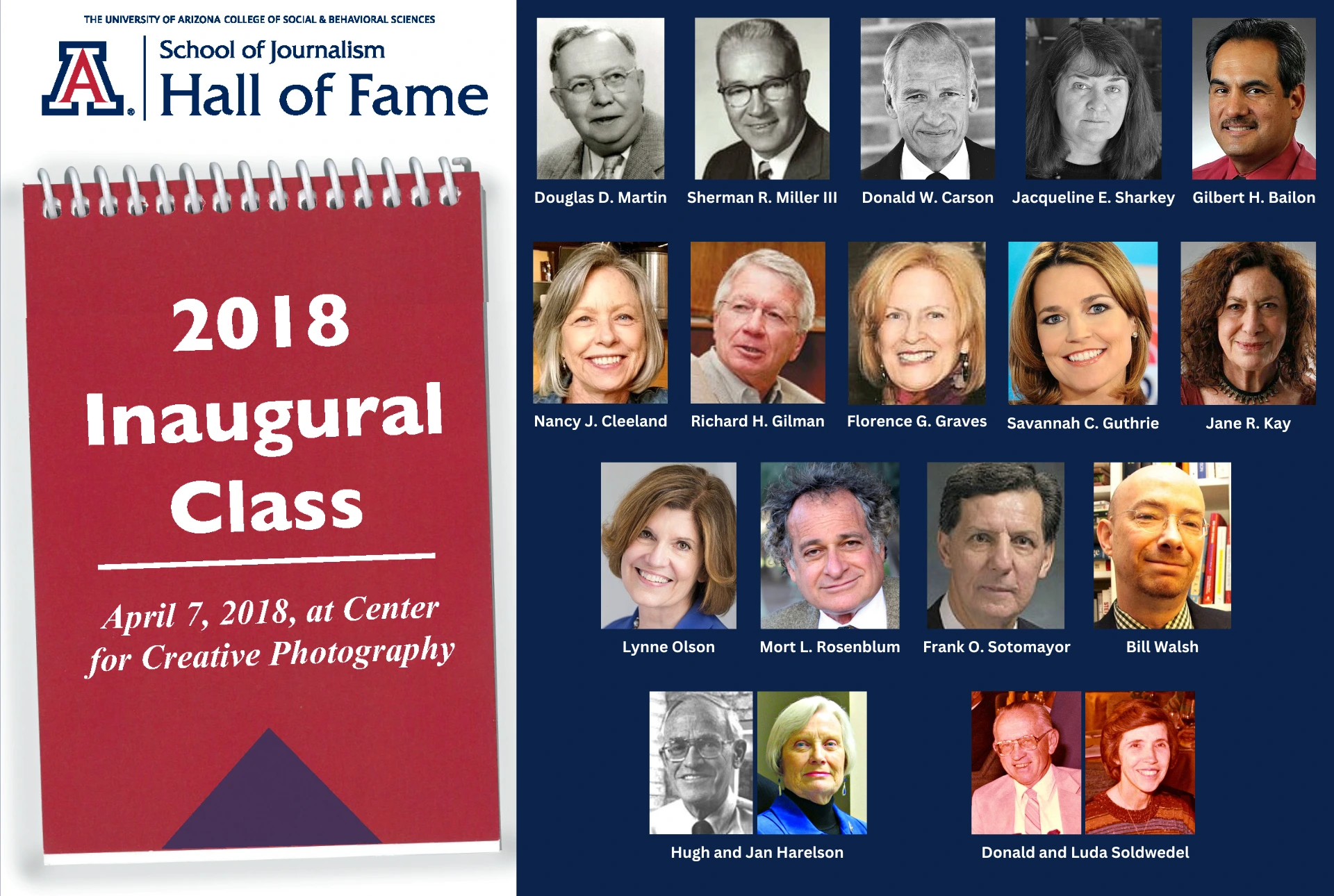
Founded the school, as it transitioned from the Department of English curriculum. Martin, who left in 1956 and died in 1963 at 78, was a two-time Pulitzer Prize-winning journalist at the Detroit Free Press. He established the school’s Zenger Freedom of the Press Award in 1953, and wrote numerous books, including “The Lamp of the Desert,” a history of the UA. The endowed Douglas Martin scholarship provides assistance to students who demonstrate excellence and financial need.
The school’s third director, Miller helped the department become accredited for the first time and received national acclaim when Esquire magazine included him among 33 of the nation’s “super-profs.” Miller, who came to the UA from The New York Times, advised the Arizona Daily Wildcat and died in 1968 at age 57 after contracting infectious hepatitis in Turkey while serving as a Fulbright lecturer.
After a career at the Arizona Daily Star and The Associated Press, the 1954 UA grad returned in 1966 as a professor and served as director from 1978 to 1985. In addition to inspiring students, he coached Arizona newspapers on their news reporting and was honored by the National Association of Hispanic Journalists for “unprecedented contributions” to the industry in the area of diversity. He retired in 1997. The endowed Don Carson Concerned Media Professionals fund provides assistance to minority students. He died Feb. 1, 2018. Read his obit and remembrances.
The 1972 UA grad founded El Independiente, the school’s bilingual publication as a professor in 1976. She reported on Latin American insurgencies, including leading coverage of the Iran-Contra scandal, and worked at the Washington Post as a copy editor. As director of the school from 2000 to 2011, she expanded the curriculum, faculty and enrollment and oversaw the move to the modern Marshall Building. The endowed Jacqueline Sharkey Watchdog Journalism Fund supports student investigative reporting projects.
The 1981 UA graduate is editor of the St. Louis Post-Dispatch, where he oversaw coverage of the Ferguson riots that won the newspaper the 2015 Pulitzer Prize for breaking news photography. He was named the Benjamin C. Bradlee Editor of the Year in 2014 by the National Press Foundation. Bailon, former executive editor of the Dallas Morning News, served as president of the National Association of Hispanic Journalists and on the board of the Maynard Institute for Journalism. He is a member of the Arizona Daily Wildcat Hall of Fame.
The 1977 UA graduate was the Los Angeles Times’ lead reporter-writer on “The Walmart Effect” series that won the 2004 Pulitzer Prize and George Polk Award in national reporting for detailing how Walmart’s drive for lower retail prices had impacted international labor practices. She also covered immigration, labor and trade at the San Diego Union-Tribune. She is deputy director of communications at OSHA in the Department of Labor.
The 1972 UA grad was publisher of The Boston Globe from 1999 to 2006. Under his leadership, the newspaper won three Pulitzer Prizes, including for its investigation into sexual abuse by Roman Catholic priests in the Boston Archdiocese, later portrayed in the Oscar-winning film “Spotlight.” Building on national writing awards he won as a student, Gilman became a reporter and assistant managing editor at the Arizona Daily Star and held numerous senior positions at The New York Times Co. The endowed Richard Gilman Scholarship Fund supports outstanding journalism students.
The 1976 alumna is the founding director of The Schuster Institute for Investigative Journalism at Brandeis University. Graves also was the founding editor of Common Cause magazine, where she won the Investigative Reporters and Editors award for showing flaws in the government approval process for NutraSweet. Her Washington Post exposes of sexual misconduct allegations against Sen. Bob Packwood led to his resignation.
Co-anchor of NBC’s “Today" show, the 1993 alumna has a Georgetown University law degree, covered the White House for NBC News from 2008 to 2011 and is a former KVOA 4 anchor in Tucson. In 2017, she received the Matrix Award in New York as one of the top women in communications. She also is the author of "Princesses Wear Pants," which reached No. 1 on the New York Times' Children's Best Seller List.
The 1961 grad was one of the nation’s early environmental beat reporters at the Arizona Daily Star, where her 1985 series exposing TCE pollution in Tucson groundwater from Hughes Aircraft Co. led to a federal cleanup. Kay went on to do award-winning work for the San Francisco Examiner, San Francisco Chronicle, National Geographic and others, reporting on the shrinking ice in the Arctic and the forest loss in the Amazon.
A New York Times bestselling author of seven books of history, the 1969 grad has been called “our era’s foremost chronicler of World War II politics and diplomacy” by former Secretary of State Madeleine Albright. Olson worked for The Associated Press as a national feature writer and as a foreign correspondent in AP’s Moscow bureau. She also covered politics and the White House for AP and the Baltimore Sun.
The 1965 UA grad covered 200 countries for The Associated Press, including as bureau chief in the Congo, Nigeria, Kuala Lumpur, Singapore, Buenos Aires and Paris. He became editor of the International Herald Tribune, then returned as AP Special Correspondent. He has written a dozen books, teaches a UA class on global reporting and is co-director of the school’s Center for Border & Global Journalism.
The 1966 UA graduate, a former Los Angeles Times editor, co-led a Times series on Latinos that won the 1984 Pulitzer Prize for Public Service. Sotomayor, chair of the school’s Advisory Council, played a key role in saving the journalism program from elimination in 1994. He is a former associate director for the Institute for Justice and Journalism at USC Annenberg and a Nieman fellow. An early advocate for news media diversity, he co-founded the Robert C. Maynard Institute for Journalism Education and CCNMA: Latino Journalists of California.
An author of three books on copy-editing, the 1984 grad was a copy chief at the Washington Post for two decades and started a renowned website for copy editors in 1995, theSlot.com. Walsh, who died of cancer in March at 55, received the American Copy Editors Society’s top honor, the Glamann Award, and helped copy-edit numerous Pulitzer-winning projects at the Post, including a series on NSA surveillance in 2014.
The couple impacted students through their leadership and philanthropy. When the department was targeted for closure in 1994, Hugh, a 1952 alum, became co-chair of a campaign to keep it open. After his death in 1998, Jan raised money for a computer lab, started an endowment to support it and funded a teaching award. Jan died in 2015. The endowed Hugh and Jan Harelson operations fund supports student and faculty activities.
The couple supported the school for more than 20 years and made major gifts to continue their legacy. Don, who owned small newspapers in Arizona, became chair of the Journalism Advisory Council and shaped its fundraising role. After Don died in 2008, Luda increased their annual gift to cover the school’s operations expenses. She died in 2016. The endowed Don and Luda Soldwedel fund supports student and faculty activities.


